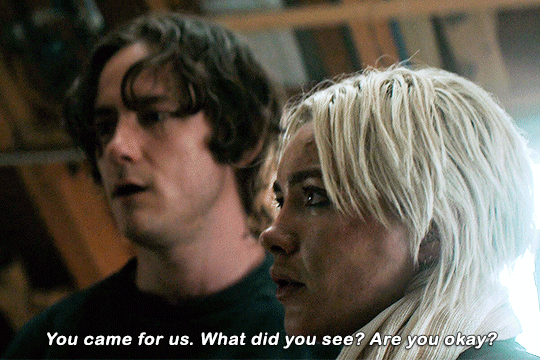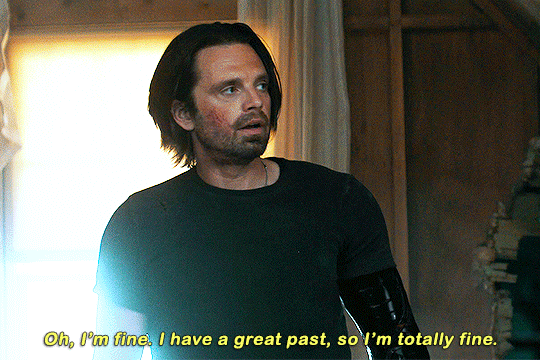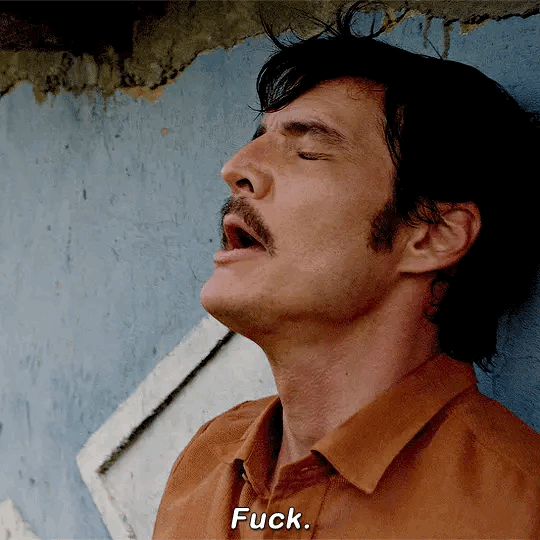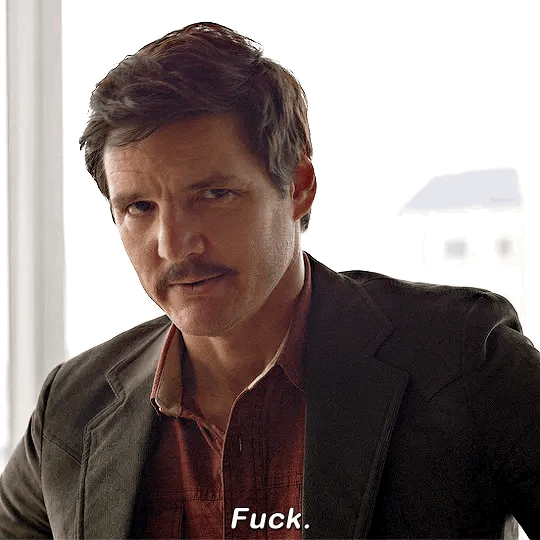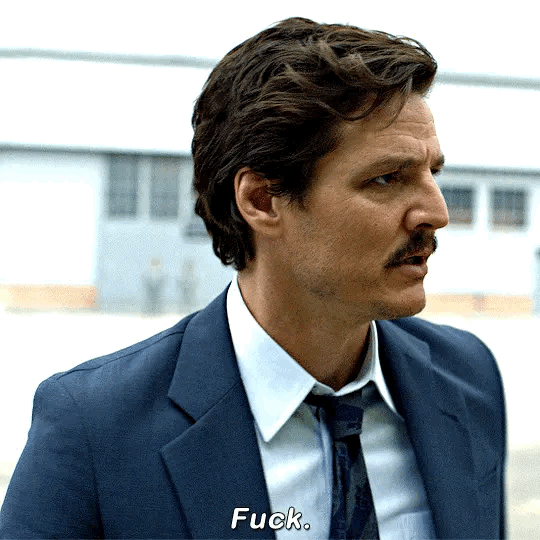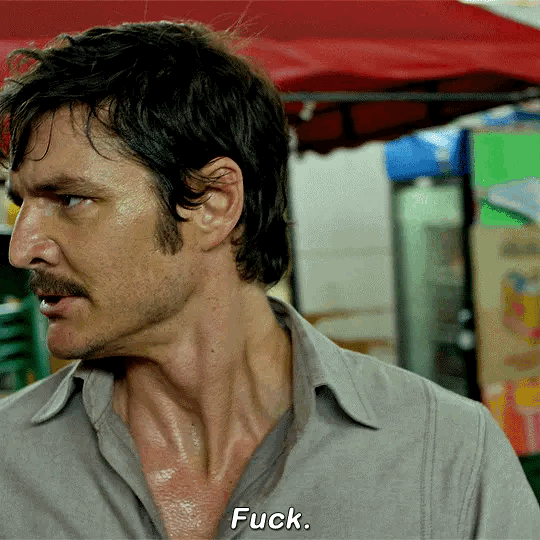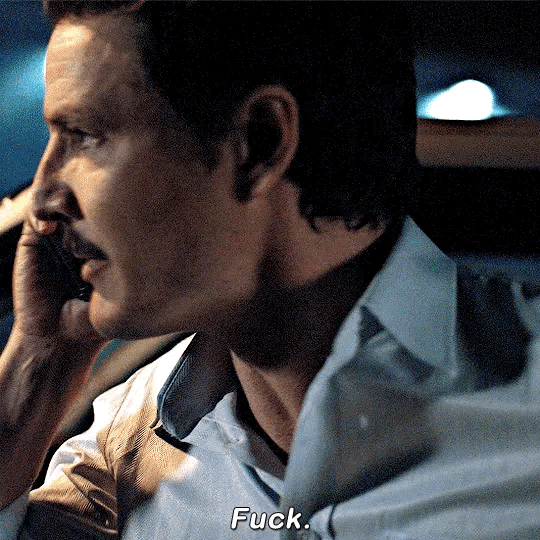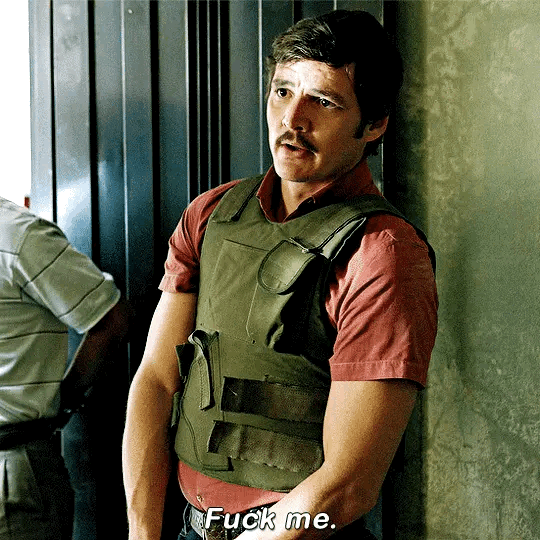search “good writing” on my blog for fic recs {some are 18+please beware of warnings!!}
Don't wanna be here? Send us removal request.
Text
Almost Caught -C.K

Setting: Kent family farm, Smallville
Synopsis: You visit the Kent farm for the weekend and watch Clark play the perfect son in front of his mom—but he’s anything but innocent when he’s alone with you in the barn.
cw: Rough sex, semi-public sex, exhibitionism risk, oral (f receiving), dirty talk, creampie, slightly bratty reader, dominant Clark, near-caught scenario, suggestive teasing, unprotected sex, filthy language.

You really were trying to behave. You swore you were.
You’d come out to Smallville for the weekend—supposed to be sweet and wholesome, meet-the-mom energy. Martha Kent was everything you expected and more: kind, warm, soft-spoken, with those homemade pies that made you question if she had some magical abilities of her own. The woman adored you, welcomed you like family.
But you were one blink away from throwing all that kindness straight out the barn window because Clark Kent in farm boy mode was something dangerously unfair.
T-shirt sticking to his chest with sweat, biceps flexing every time he lifted a hay bale, that damn cowboy hat he wore backward while fixing the tractor. You watched him from the porch like a woman possessed, thighs pressed together, sipping lemonade with trembling hands.
He’d kiss your cheek sweetly in front of his mom, whisper “you okay, baby?” with that boy-next-door charm like he didn’t fuck you raw the night before in the backseat of his truck with your panties shoved in his pocket.
By noon, you couldn’t take it anymore.
You caught him in the barn, alone, wrench in hand, working on some old farming equipment. Sweat dripped down his neck, his white tank clinging to every ridge of muscle.
“Clark,” you breathed, stepping in behind him and shutting the barn door.
He turned, brow furrowed, wiping his hands on a rag. “Something wrong, sweetheart?”
“Yeah,” you pouted, toeing off your shoes. “My boyfriend’s being way too good in front of his mom and it’s driving me insane.”
He chuckled, setting the wrench down and crossing his arms. “You like seeing me play the perfect farm boy?”
“You have no fucking idea.” You closed the space between you, slipping your fingers under the waistband of his jeans, your voice dropping. “It makes me want to be a very bad girl.” Clark’s jaw tensed—his kryptonite wasn’t green anymore. It was you.
“You know we can’t—”
“I locked the door,” you whispered, licking up his throat. “Unless you want your mom to find out what a dirty mouth her sweet son actually has when he’s knuckle-deep in me—”
“Jesus,” he hissed, grabbing you by the waist and pinning you to the nearest stall wall. The air left your lungs as your back hit the wood, his thigh forcing its way between your legs.
“Thought I was being nice,” he growled against your throat, “but you just don’t know how to act, do you?”
“Not when you walk around like that,” you whined, grinding down on his thigh, your panties soaked through your shorts. “You’re killing me, Clark.”
He popped the button on your shorts like he was pissed, yanking them down with your underwear in one go. He didn’t even bother undressing himself—just pulled himself out, already hard, thick, angry.
“You want to get fucked like a slut in my mama’s barn?” he muttered, hiking one of your legs around his hip.
You nodded desperately, arms thrown over his shoulders. “Want you to—
You didn’t get to finish the sentence—he shoved into you in one brutal thrust, knocking the wind from your lungs as your nails dug into his back.
“Oh fuck— Clark—”
“Shut up,” he grunted, pounding into you with slow, punishing thrusts. “You’re gonna get us caught.”
“You’re the one—oh God—fucking me like this!”
He bit down on your shoulder to keep himself from groaning too loud. You were soaking wet, squeezing him like your pussy was made for him, and the sounds of skin slapping filled the barn with every thrust.
“You like being fucked where anyone could walk in?” he hissed into your ear, holding you up like you weighed nothing.
“Yes—yes—fuck me harder—”
He angled his hips, hitting that spot inside you that made your eyes roll back, and then—just as you were spiraling, breath caught in your throat—
“Clark? You seen the pie dish?”
Your heart stopped. Martha’s voice came through the window, clear and close. Clark froze, one hand clamping over your mouth, the other still gripping your ass as your body trembled on the edge of orgasm.
Your eyes met his—wild, terrified, turned on as hell. He stayed still, cock buried inside you, both of you straining to hear.
“Check the pantry!” he called back, voice perfectly casual. The man didn’t even stutter.
You wanted to moan, but his hand stayed firm on your mouth. You both waited in silence, barely breathing. Then—footsteps retreating.
Clark smirked. “Told you we’d get caught if you kept acting up.”
Your nails dug into his shoulders as you whispered, “Don’t you dare stop now.” He didn’t. He fucked you harder. He had you coming in seconds, his hand still over your mouth, soaking his abs with your slick as your body shook. He didn’t stop until he was full of you, pumping you full of hot cum with a grunt in your ear. You gasped into his shoulder, body twitching from overstimulation as he stayed buried inside you, panting against your skin.
“Jesus Christ,” you whimpered when he finally pulled back just enough to look at you—his eyes blown, sweat dripping off his temple. “You’re gonna make me walk back in there leaking down my thighs.”
Clark laughed, breath hot against your neck, voice low and smug. “Good. Maybe you’ll behave now.”
You scowled, still trembling, tightening your legs around him. “You’re an asshole.”
He nipped your jaw. “Keep it up and I’ll take you right here again after dinner. Bet you’ll still be wet.”
He let you slide off him slowly, steadying you with that absurd strength like you weren’t melting. You wobbled when your feet hit the barn floor, thighs slick and sore, your pussy aching and stuffed full of him.
You reached for your shorts, legs jelly, but Clark caught your wrist. “Leave ’em,” he said, smirking as he pulled your panties from his back pocket—the same ones from last night. “I’ll hold onto these.”
“Clark,” you hissed, wide-eyed. “I have to sit at the table with your mom!”
He leaned in, kissed your swollen mouth, and whispered, “Then try not to squirm too much, sweetheart.”
Back in the house, you sat at the Kent family table like nothing happened. “Everything okay?” Martha asked sweetly as you stepped back inside the house.
You cleared your throat, forcing a smile and ignoring the way your legs wobbled. “Just needed some fresh air.”
Clark kissed your cheek like the gentleman he absolutely wasn’t. And under the table, he slid his hand up your thigh again.

a/n: my cat is sick and im writing smut to not lose my mind lmao. i hate adulting. luckily the vet can see us tomorrow morning so im hoping for the best for my furbaby. sorry for ranting like this im losing my mind because thats my baby and if anyone has a cat who stopped eating all of a sudden any advice/comfort would be appreciated<3
#in case anyone thought i wasn't on this bandwagon#here i am#a puddle#god i need that man#good writing
3K notes
·
View notes
Text
WHERRRRREEEEE ARE THE NOTES ON THIS
Permanent Scars - B.Barnes

Pairing - Post-Thunderbolts!Bucky x Urban Renewal Specialist!Reader
Genre - Fluff, Angst, Smut
Warnings - pretend that Bucky lived in the Avengers Tower after his deprogramming in Wakanda (maybe he did a back-and-forth thing to attend events in New York while primarily residing in Wakanda), takes place in the 14 months after Thunderbolts, emotionally constipated!Bucky and reader, smut, unprotected sex, p in v, fingering, oral (f receiving)
Summary - As an urban renewal specialist, you rebuild what’s been broken while Bucky carries what can’t be undone. Through bars, bookstores, and blueprints, your paths keep crossing, each moment a quiet reminder of what was lost and what can be fixed. Somehow, in the wreckage, you meet in the middle, building something new from the rubble.
Word Count - 9.0k
Author’s Note - My first ever smut piece for Bucky! And also my longest work for him yet. I wanted to write something that I’ve never written before. I so often see Bucky paired with some type of enhanced reader or the Congressman x Assistant trope, but never someone that works parallel to him, close but never touching. I’ve also been enjoying all of the ‘tweet like you live in the MCU’ stuff, and this was one of the ideas I’ve gotten from them. However, I know nothing about urban planning, civil engineering, etc., so please just walk with me here lol

Now Playing: Permanent Scars (EP) - Christopher

Track 1 - Permanent Scars
The morning haze hadn’t lifted from Washington yet, but the streets were already loud with jackhammers and low-simmering complaints. Dust curled off a half-demolished row of bricks, clinging to scaffolding, to work boots, to lungs. The street still smells like ash—not fresh, but that lingering kind that clings to warped rebar and memory.
You adjusted your safety vest and narrowed your eyes at the warped blueprints clipped to your work tablet. The budget for city reconstruction was laughable, too many shortcuts, and not enough reinforcement along the drainage line. Again. Behind you, two contractors argue about the new electrical wiring, and ahead, another crew is tearing up the sidewalk where a sewer line burst after Sam Wilson slammed a Hulked-out U.S. President into a laundromat almost a year ago.
“Wouldn’t need all this if the damn Red Hulk didn’t plow through it like a cartoon,” one of the contractors muttered nearby, wiping sweat and grit from his brow.
Another worker nodded, growing a plastic water bottle into a wheelbarrow. “Every time they show up, they wreck more than they fix. Heroes, my ass.”
“Wouldn’t need these patches if the damn heroes could keep their fights in the sky,” someone else muttered.
You don’t turn around. You don’t comment. You’ve heard it all before. Resentment was common. It echoed off brick and rubble like reverb in a cathedral. You felt it too. Quietly. Reluctantly.
You say you work for a neutral civic initiative—post-Blip infrastructure, nonpartisan rebuilding. But everyone knows your organization gets a majority of its funding from the New Avengers Foundation.
Everyone sees the dirty Avengers lanyard still looped around your neck, the peeling Iron Man sticker on your tablet case, and the Captain America pin, albeit small and scuffed, tucked against the collar of your high-vis vest. You forget it’s there until someone looks too long.
And then, like a misfired memory, you feel him before you see him.
Across the street, just beyond a busted green awning where a bodega cat glares from behind a shattered window pane, he steps out—pressed slacks, a dark coat, collared shirt beneath, and a navy tie that’s slightly askew like he just yanked it loose. His hair is longer now, neatly combed back, and his beard is groomed to something sharp and official. A United States flag pin glints on his lapel while his hands are in his pockets.
James Buchanan Barnes.
There’s no mistaking him, not even when he’s dressed like a man who writes policy instead of breaking through windows. It’s in the way he moves—shoulders drawn taut beneath the coat, eyes scanning without staring. Still wired for threats, still listening for footsteps that don’t belong. The morning light halos around him in a pale gray haze, and something in your gut twists.
It’s been years since you last saw him, but memory doesn’t age like faces do. You still remember the first time you spoke to him at a S.H.I.E.L.D. fundraiser, of all places. You were just an intern then, in a hand-me-down dress with fraying seams and a glass of champagne you didn’t know how to keep steady. He was dubbed an ‘esteemed guest’ and shoved into a suit he clearly hated. He said more with his silences than most people did with speeches. You had only exchanged a few words that night, but they’d stayed with you throughout the years. Short, steady, and weighty.
You kept crossing paths for a while after that. You moved from the urban reconstruction initiative in S.H.I.E.L.D. into full-time work under the Avengers while the former organization was revealed to be compromised and undergoing internal investigation. You attended meetings led by Tony for infrastructure recovery, reviewing budget allocations, and learning where every dollar went after every battle on the streets.
You weren’t a hero, not the way they were. But they started calling on you like you were something close. A handful of galas and a hundred or so meetings in the Avengers tower led to the far and few conversations you had with Bucky, always on the sidelines. Quiet, but never forgettable.
Then the Snap happened, and the world started bleeding from too many cracks to plug. People scattered, towers full. You never expected to see him again, especially not like this.
And yet here he is. Bucky Barnes, walking toward a building you helped redesign after it was blown up three years ago by some street-level vigilante. He wore the weight of policy like it was a second uniform and looked more like a senator’s aide than the soldier history taught you to pity.
He doesn’t look across the street at first, yet you know the exact second he senses you from the slight shift in his posture, the way his head tilts, like a wolf catching a scent in the wind. And then his eyes meet yours.
You don’t smile. He doesn’t wave. There’s no reunion music here. Just cement dust, morning chill, and the humming tension of too many words left unsaid.
You don’t know if he has changed. But you know you have.
He clocks your vest, the blueprints tucked under your arm, the crumbling infrastructure behind you. Then his eyes land on the Captain America pin. You think you see his mouth twitch, just a little, but not quite a smile.
As he approaches, you straighten. Involuntary. Defensive. Proud. He’s not the only one who can scan a person in three seconds flat.
His voice is rougher than you remember. “You always were better at cleaning up the messes.”
You raised a brow at his words. “Somebody has to.”
He nods, slowly. “Didn’t think I’d see you out here.”
“Didn’t think you still walked the streets without an escort,” you shot back, poking at his position as Congressman and New Avenger.
He lets the jab hang there for a beat before answering. “I’m enough protection for myself. And I’m just out getting coffee,” he says simply, motioning over to a café, miraculously still intact.
“I thought you hated cafés,” you murmur.
He shrugs. “Still do. But they’re the only ones open this early.”
You don’t know what to say to that. You don’t know if you want to say anything at all. So you don’t.
The quiet doesn’t stretch awkwardly. It sits heavy but familiar. It’s the kind of silence that used to happen between you two back at the galas and the hallways of the tower when neither of you had their words, but both of you were thinking the same thing.
The voice of a contractor cuts through it. “Hey, you wanna look at this foundation line before the city inspector comes breathing down my neck? Some of the outer supports still look like they’ve been through an alien attack.”
You glance over and nod, about to walk away, when the contractor adds with a snort, oblivious to who you’re talking to, “no offense, but next time a superhero levels a block, they should at least send someone who knows how to swing a damn hammer.”
You see it before you hear anything—the flicker in Bucky’s eyes, the tension that threads through his jaw. The contractor doesn’t know a super soldier is right next to you. He probably wouldn’t have said those words if he did.
You heave an exhausted sigh. “I should get going.”
Bucky doesn’t bristle. Instead, he exhales a short breath, almost a laugh. “Welcome to politics,” he says wryly, as if that explains the whole situation.
You offer a faint smile. “Should’ve stuck to brooding in corners. You were better at that.”
His lips curve, just barely. “Still do that. Just now I wear a tie.”
You let out a soft huff, amused despite yourself. Then, more gently, “be careful, Barnes.”
“I’m not the one working on a half-demolished building,” he points out.
“True,” you concede, already stepping away from him, “but at least my job doesn’t require shaking hands with people who used to fund HYDRA.” That one lands, and you both know it. He doesn’t argue. Just dips his chin in a faint, solemn nod.
You turn before the air gets too tight, before one of the workers calls you again, before you do something reckless like stay and ask him how he’s really been. The sound of your boots crunching over gravel fills the space between you.
“Hey,” he calls out, quieter now. “Don’t vanish again.”
You pause and glance back at him, just a little. “Didn’t plan to.”
That’s the closest either of you got to honesty that day.

Track 2 - Lose A You
The rain started as a warning—a slow, hesitant drizzle over the city. Then it turned harsh with thunder in the distance. The planning meeting was the first thing to get washed out.
It wasn’t just any meeting either. Valentine had commissioned your firm to help with the continued reconstruction of Lower Manhattan after the Void Event. She called it ‘strategic optics.’ You called it ‘trying to put a manhole cover over a crater’. You were supposed to be reviewing the zoning for a new multi-use shelter hub, but the downpour made it impossible to walk the perimeter, so your crew packed it up early.
You ducked into the nearest bar on instinct, not because it was convenient, but because it was familiar. The place was one of the only neighborhood joints in the city to survive the past decade mostly intact. Every contractor on your team treated it like a second break room. The staff here knew you by name, and by drink.
As you step inside, brushing water from your shoulders, the manager behind the bar gives you a nod and starts pouring before you even sit down. You’re halfway to the counter when you spot him in the corner booth, hood up and shoulders hunched, like the world had settled too heavy again.
“You stalking me now?” you ask, tone light.
Bucky looks up, and for a second, the weariness in his eyes almost convinces you to sit somewhere else. But then he tilted his head to the open seat across from him. No smile. No protest. Just room for you.
You slide in. He offers you a few fries from the basket in front of him. You decline, and he doesn't press.
“Still doing city work?” he asks after a beat.
You nod. “Still trying to fix what the world keeps breaking.”
He exhales through his nose. “Figures. You always were good at picking up after the rest of us.”
You take in his appearance fully. He’s in a worn leather jacket and a plain black shirt, damp from the rain, the sleeves of his jacket shoved halfway up his forearms. No gear. No badges. Just him.
“What about you? Hiding from the world or just this side of New York?” you ask.
“Hiding from the team,” he admits, dragging a fry through cold ketchup. “They’ve been trying to get me to join a TikTok challenge for outreach.”
You laugh into your drink.
He shrugs. “Figured this place would be safe. Didn’t know you were back in town.”
“I’m always in town.”
He looks up, surprised. “You come here often?”
“Long enough that the staff knows what to pour when I walk in.”
Bucky leans back, eyes scanning your face like he’s trying to calculate things. “Guess I always thought you’d moved on. After the Blip, after Tony….”
Finally, he asks quietly, “why’d you start this work? City infrastructure, planning…You could’ve done anything else.”
You stare into the glass in front of you. “I interned at S.H.I.E.L.D. back in the day. Did you know that?” He shakes his head. “My childhood apartment was in the city. When the Chitauri came through the sky, I watched our ceiling cave in. I didn’t even recognize the street I grew up on the next day.”
Bucky doesn’t say a word, doesn’t interrupt.
“I admired them. The Avengers. I still do, in a way. But when you lose your home to the very people meant to protect it, something changes. You see both sides. The people who live in the rubble and the ones who caused it, even if they didn’t mean to.” You finally lift your eyes to his. “I believed in heroes. But after that? I get why people wanted rules and why they were scared. They didn’t want another Ultron…or a Winter Soldier.”
Bucky’s jaw tightens. He turns away slightly, the overhead light catching on the black panels of his hand. “They wrote the first drafts of those because of me.”
“Hey,” you say gently. “Don’t do that.”
He faces you again, his eyes narrowed. “You’re defending the Accords.”
“No. I’m defending people’s right to want to feel safe. But you’re not the reason why they w Your hand finds his wrist, your fingertips brushing the cool vibranium. “No. They wrote them because governments got scared. You were just the easiest face to pin and make people fear.”
You took a breath, then added on, “you once told me that people only rebuild when they believe something’s worth saving. You said that to me at some Stark gala, thought you were just being nice because I looked lost and underdressed.” His gaze snaps back to you, startled, but you didn’t flinch. “I remembered…figured you didn’t.”
“I did.” His response is immediate, sharper than you expected. “I do remember. I never forgot anything you said to me. Sometimes I would think about your words, your voice, while I was in Wakanda. After….everything. It stayed in my head longer than most things did.”
You inhale. It’s too much and not enough. Your pulse hammered in your ears.
“I remember that night,” he admits quietly. “You had a crack on your phone and a sheet with handwritten notes about how to redesign emergency shelter protocols that you would tell to anyone who would listen.”
You laugh a little. “I thought you forgot.”
“I didn’t.”
That stops you cold.
You had spent years convincing yourself you were a ghost in the background of the Avengers, a function of Tony’s payroll, not someone to be remembered. But yet he did and he didn’t just remember your voice or your words. He remembered you.
“I used to wonder where you’d gone after the Blip,” he continued. “I kept looking. You weren’t with the team. You weren’t in the Tower for meetings. I thought maybe I’d imagined you.”
Something shifts in your chest, something undeniable.
Your phone buzzes on the table, but you don’t check it yet.
“I started my own firm. Urban protection and recovery. We partner with communities impacted by enhanced incidents—rebuilding housing, reinforcing infrastructure, and making sure the right people are being heard.”
Bucky leans back a little, his shoulders pressing into the cracked leather of the booth. “You were always the only one in those meetings who spoke like every life mattered.”
You blink, taken aback. “You remember that?”
He hums while taking another fry from the dish. “You fought like hell for a safer subway system after that alien guy came down and tried to kill Tony, the sorcerer, and that spider kid.” He paused. “Tony said you were annoying. I liked hearing you argue with him.”
“And he paid me to do it, too,” you add, half-laughing. “Can you believe that?”
You hesitate for a second, then continue, “I kept up with you, after…you know…” You shift your glass slightly on the table. “I watched the news about the Flag Smashers when you and Sam started showing up. And then when you ran for Congress with all those speeches.”
“Bad campaign decision.” He exhales a laugh. “No one tells you how exhausting smiling is.”
“You never smiled at those galas either.”
His eyes shift fully to you, a flicker of something softer there. “Didn’t have a reason to.”
You hold his gaze, and for a moment, both of you are silent as if letting the weight of the past catch up.
Your phone buzzes again, and you glance down. It’s a message from one of your contractors, telling you the crew decided to meet again tomorrow, same time, same place. You stare at the screen for a bit longer than you should.
When you finally look back up, Bucky’s watching you. Carefully. Thoughtfully. Like he’s deciding something.
He clears his throat. “You ever been to the new Watchtower?”
You shake your head. “Didn’t know it was finished.”
“It’s not like it was before. It’s not all team briefings and PR.” He leans in, putting his elbows on the table and propping his chin up on his right hand, tracing shapes with his left. “Some of us are actually trying. Making real connections again. Trying to fix what we broke. I thought maybe you’d want to see that.”
You study him, his expression, his body language. His tone isn’t performative, not like he’s trying to sell you something. If anything, he sounds tired. Hopeful, but tired.
“You’re inviting me to a superhero hideout?” you ask, quizzically.
He shrugs. “I’m inviting you to see that maybe we’re not all lost causes.”

It’s late when you arrive. The Watchtower isn’t quite the gleaming monument it once was—less a beacon now, more a repurposed husk with heart.
Inside, it’s quieter than you expected. Warmer too. There’s a faint hum of activity down a corridor, the sound of muffled chattering and music playing. It’s domestic in a way you’d never imagined the Avengers could be.
You walk alongside Bucky through wide, echoing halls that hold memories neither of you forgot. “I used to think this place was untouchable,” you murmur as you pause beside a glass panel, a floor-length window overlooking the city below. “It felt like this tower would always be watching over everything. Even when it crumbled, it still felt like a symbol.”
“And now it’s just…home for a bunch of weirdos who can’t retire,” Bucky remarks.
It makes you smile a bit. “That doesn’t seem all that bad.”
He doesn’t reply, but you feel his eyes on you as you take a slow turn through a hall. The residential area. It wasn’t somewhere you had gone often, but there was one time you had stood behind Tony, watching over his shoulder as he talked with Steve about rebuilding an area in Brooklyn.
You hear voices—loud ones—growing closer. Bucky reacts instantly. Not with fear, but with the familiar instinct to shield. He reaches for your wrist gently and tugs you toward the nearest door.
“Come on,” he says under his breath.
When the door clicks shut behind you, the noise outside is muted. Inside, you take a moment to breathe in the space. His room.
It’s personal. Not military, not sterile. There’s a record player in the corner, a few jackets slung over the back of a worn armchair. A small shelf holds books—actual books, not just tactical manuals. There’s a framed photo on the desk, turned halfway toward the wall. You can’t quite see who it is.
You step towards the bookshelf, running your fingers along the edge of it, and glance back at Bucky. “You decorated?”
His lips press into a line, but he doesn’t deny it. “Didn’t feel like the space was truly mine until I did.” There’s a softness to the way he leans against the closed door now, arm crossed over his chest. No team to run from. Just you.
Your fingers trace along the spines of books that were clearly well-loved. “You know, I used to think you didn’t keep anything aside from the backpack you came in with, like you were afraid if you left a mark anywhere, it would mean you existed.”
Bucky shifts slightly, the corner of his mouth pulling tight like he wanted to say something but bit it back.
You turn to face him. “But this…this feels like someone who finally isn’t afraid of being known. “
He exhales a breath that almost turns into a laugh, but doesn’t quite make it. “Someone on your team said we don’t belong here, the team of us,” he says after a moment. “That all we do is leave damage behind for someone else to clean up.”
Your chest tightens. “Who said that?”
“It doesn’t matter,” he replies, shaking his head. “The thing is…they’re not wrong.” He looks at you, his words coming steady but raw. “That’s the cycle, isn’t it? I destroy, you rebuild. Over and over. It’s starting to feel like all I leave behind is damage and hurt under the guise of false hope and promises.”
You step closer, and the air between you shifts, less tension and more weight. “You don’t just break things, Bucky. Sometimes you make space for something new to grow, and I think that counts for something.” Silence follows. Not the kind that demands to be filled, but the kind that lets things settle.
“I used to think we were on opposite sides,” you continue. “But maybe we’re just…different halves of the same machine. You break things and I put them back together in a way they were meant to be.”
His eyes soften. “That’s a pretty generous view of someone like me.”
You take another step. Close enough that his breath brushes your skin. “It’s not generosity. It’s recognition.”
The distance between you is there, but it’s heavy with all the thoughts you couldn’t bring yourself to voice. Instead, your hand finds his jaw, tentative. He doesn’t flinch away. He simply looks at you as if he’s seeing you truly.
When you lean in, the first press of your lips to his is almost reverent. A question, not a demand.
Bucky answers without hesitation. His lips move against yours gently, a little uncertain but sure in their wanting. It’s neither rushed nor desperate.
You pull back, barely, searching his eyes for something—regret, confusion, anything that might stop this before it goes further. But then he’s the one who comes back in.
The second kiss is different. There’s no hesitation this time. His hand slides around your waist, the other curling at the nape of your neck like he’s anchoring himself to the moment. You find yourself pressed against him, fingers threading into the fabric of his shirt, feeling the warmth of him, solid and steady.
His head tilts and he takes. His mouth parts yours open, messy and warm and wanting. You sigh against him, the sound swallowed into him like it was meant to be kept.
His lips slow before they stop altogether, his forehead resting slightly against yours. His breath fans over your cheek, shaky and soft. “You know,” his voice low, “we never really talked much…back then. But I still remember,” his fingers brushed the hem of your shirt like he’s testing a boundary, “the way you looked at me in the hallways, the way you talked to me at events as if my opinion mattered. I always thought it meant something.”
His words make your breath catch.
“I think we do have shared experience even if we were never close,” he says quietly. “The grief. The guilt. The way we both keep pretending we’re fine when we’re not.”
That breaks something in you. Not painfully, but just enough to let the ache show.
You don’t answer with words. Instead, you kiss him again with purpose, like you’ve decided, like you know what comes next.
Bucky kisses you back immediately, relief melting into the heat between your mouths. This time, you both lean in fully. Your hands drift up his chest, curling at his collar as you push the jacket off his shoulders. He shucks it off without ceremony, throwing it to the floor before pulling you closer.
Clothes come off in intervals, naturally, as though your hands know each other already. When your shirt finally drops to the floor, his hand pauses at your bare waist. Bucky looks at you like you’re something delicate. Precious, even.
“You’re beautiful,” he murmurs.
You’re both bare by the time you reach the bed. He settles you onto it gently, like laying down a memory. Then he hovers above you, eyes flickering over your face. He kisses your mouth once more, then your throat, your shoulder, his metal hand stroking down your side.
When his fingers finally slip down to your heat, you’re already aching and open. He exhales shakily at the feel of you, his eyes fluttering shut as if it wasn’t just his fingers he was using.
As he strokes two fingers through your folds, his eyes darken at the slick he finds. You arch into his arm as he teases your entrance, dipping in just enough to make you want more, your thighs twitching around him.
Your own hand finds his cock, already heavy and hard, where it sits against your thigh. He groans when you wrap your fingers around him and start to stroke, slow and matching the rhythm of his own hand working you open.
“That feels so good—fuck,” he mutters, his voice cracking when you twist just right.
When your thumb brushes across his tip, he groans low in his throat, his eyes fluttering shut for a moment. When he opens them again, they’re darker. Focused.
“I want to taste you.”
You blink up at him, breath catching.
“I want to make you fall apart before I’m inside you,” he adds, his voice wrecked with sincerity.
He slides down between your legs and drapes your thighs over his shoulder like it’s instinct. The first press of his tongue is careful and curious. Then, he licks into you like he’s trying to memorize the taste, making you gasp.
When your legs tighten around his shoulders, he moans into you, the vibrations shooting through you and causing you to buck against his mouth. His metal hand comes to rest on your lower stomach, pinning you down. He eats you out with a patience that borders on worship, his tongue tracing slow, precise circles around your clit before plunging deep, over and over, until you’re trembling.
It’s the warm glide of his fingers that sends you over the edge, paired with the way he looks up at you—like you’re something sacred, something he doesn’t believe he deserves—that unravels you. The tension coils tight in your core, building with each drag of his tongue, each precise press of his fingers curling inside you. Your hips lift of their own accord, seeking more, needing it.
“Bucky—fuck—” you gasp, and your hand flies to his hair, fingers threading through the soft strands as your climax hits.
It’s molten. A flood of sensation that crests and crashes over you, your muscles clenching, back arching. Bucky doesn’t stop, not until your thighs tremble and you give a firm tug to his hair, pulling him up into a kiss that tastes equal parts salty and needy.
Your slick coats his lips, and you taste yourself on his tongue, the sensation only adding to the need growing between your legs when he grinds his cock against your thigh.
“Bucky,” you breathe, and he looks at you like the world might end if you say you’ve changed your mind. But you don’t. You just exhale a quiet “please.”
He nods. Once. Slow. Like a promise.
He lines himself up and rests there, the head of his cock brushing against your entrance, both of you holding still for just a beat, as if acknowledging the shift in your relationship and the fact that nothing will be the same after this. He presses in slowly, thick and steady, inch by inch, until he’s fully seated inside you, your bodies flush.
For a moment, he doesn’t move. His forehead rests against yours, and all you can feel is the stretch, the fullness, the way your body accepts him like it’s always known him, like there was always going to be a moment like this.
“Doing okay?” he asks, not moving above you.
You hum, arms wrapping around his shoulder. “Yeah,” you whisper. “More than okay.”
He pulls back just enough to thrust in again, the rhythm slow and careful. Each drag of his cock inside you is deliberate, as if he’s learning every inch of you from the inside out, mapping you by feel. You meet him stroke for stroke, your nails skating across his back, your legs wrapping around his waist to keep him close.
It’s not just sex. It's a discovery. It’s years of weight condensed into this single moment, this slow and simmering give and take.
You kiss him again, softer and less urgent. His hands find yours, fingers lacing together above your head as he moves inside you. It’s a slow, steady rhythm, like the tide pushing against the shore—patient, relentless, inevitable. The stretch of him inside you makes your body arch, makes you keen against his mouth. He groans low at the way you squeeze around him, burying his face in your neck as his hips roll forward again.
The friction is maddening. Your slick heat wrapped around him, your thighs bracketing his hips, your heartbeat pounding in rhythm with every deliberate stroke. His body is so close, pressed flush to yours, chest to chest, forehead to forehead, his breath mixing with yours in the narrow space between.
“Fuck, you feel so good,” he murmurs, lips brushing your temple. “So good…”
You tighten around him in response, the tension curling in your belly once more. Not sharp or fast, but inevitable and overwhelming. You feel it building, from the inside out, pulled taut like a string that’s about to snap.
“Bucky—” you moan, louder than you expect, the sound breaking free before you can stop it. You cry out, gripping his hands where they’re still tangled with yours above your head, and the orgasm rolls through you, hot and aching, slow but consuming. Your body clenches around him, and you feel him falter.
“Fuck,” he groans as he tries to hold out. But the feel of you, the way you’re writhing beneath him, it’s too much.
You feel him start to pull out, but before he can finish, you let go of one of his hands and reach down between your bodies. You wrap your fingers around the slick length of his cock, stroking him through it.
“Come for me,” you urge, watching his face.
That’s all it takes.
“Fuck—” he chokes out, hips stuttering as he spills himself across your stomach in hot, thick streaks. His eyes flutter closed, mouth parted, completely undone as you stroke him through it, using your slick and release to glide along his length. You watch the way his jaw flexes, the way his breath catches in his chest, the way he says your name like it’s the only thing anchoring him to this moment.
While he’s still trembling, you guide him upright gently and lean down, pressing a soft kiss to the flushed head of his cock, then licking away the final bead of cum clinging there. Bucky exhales something like a moan, his chest still heaving.
After a moment, he reaches to his nightstand for a tissue to clean you up, careful and quiet, the gesture more intimate than anything he’s said. When he’s done, he lies beside you, pulling you into the curve of his body without needing to ask.
His metal arm wraps around you like instinct, drawing you in until your back is flush with his chest, his hand resting low on your stomach, right over where he’d just been. Your skin is still warm, damp in places, but it doesn’t matter. What matters is how close he holds you, as if letting go might undo everything.
You can feel his heartbeat against your spine—uneven, slowing gradually—and the way his breath ghosts against your shoulder. One of his legs tangles with yours, grounding you, and his fingers, still a little unsteady, trace soft circles over your hipbone.
No words, just silence and skin. You breathe him in, pressing into the warmth of his body, the comfort of being somewhere you didn’t realize you missed.
It’s only when your breathing finally evens out that you notice the muffled sounds beyond the door. Footsteps down the hallway. Laughter. The distant clink of a spoon against a mug. Life in the tower, moving forward like nothing’s changed.
But everything has.
You curl your fingers around his wrist and hold it there against your belly. His metal hand, the one he doesn’t always trust, rests against your thigh like it belongs there. And maybe it does.
But when you wake the next morning, he’s gone.

Track 3 - It Could Have Been Us
Three weeks. No word from him. No note. No call. Just silence.
For three weeks, you walk through a ghost version of your life, haunted by fragments of that night—his mouth on your skin, the stretch of him inside you, the way his chest rose and fell beneath your cheek after. Skin to skin. Real. Or at least, it felt that way…to you.
You try not to let yourself get distracted thinking about him. You tell yourself you’re not that girl and you’re not someone who breaks protocol for a man who can’t even say goodbye.
But still, you look.
Each time you’re out in the field supervising rebuilds, negotiating zoning lines, reviewing environmental damage reports, you scan rooftops, alleyways, the far ends of crumbling lots for him. A glimpse. A shadow. Anything. You even check your phone at night with a tiny sliver of hope that maybe, just maybe, he somehow got ahold of your number or even wired your phone.
But your screen stays dark. No strange pings. No unmarked numbers. Just silence.
You start to wonder—did you misread everything? Did you dream that night into something bigger than it was?
Because there’s no way a man touches you like that and forgets it. No way he moves that well, grinds into you with that kind of practiced focus, finds your pulse with his lips, and breathes against your skin like he’s praying—for what? Mercy? Meaning?
No way it was just a one-time thing.
Unless it was. Unless he knew exactly what he was doing, inviting you to the Watchtower. Unless all of that tenderness, all of that depth was just another skill in his arsenal, another tool left over from years of being told who to be, how to move, how to manipulate people.
Maybe you were just convenient. Familiar. Close.
Maybe he regrets it.
The thought sits in your chest like wet concrete, heavy and unyielding. You start to hate yourself for hoping. For believing.

You’re off duty when you see him again.
It was an early Sunday, one of those times when the city still feels gentle. The bookstore smells the way it always does—paper, coffee, dust warmed by sunlight. The scent that comforts you when you want to disappear, when you want to feel like a girl again and not a displaced urban planner with dirt on her boots and burnout in her bones.
You’re halfway through the sci-fi aisle when you see him.
His vibranium hand cradled a novel in the historical section, the other turning the page with more care than the average person would. You could see the way his eyes tracked each word like it mattered.
And somehow, at that moment, like he felt your gaze on him, he looked up.
The moment stretches between you. One heartbeat. Two. Three.
“Hey,” he says, almost unsure.
You freeze, your brain caught between fight or flight, yet you still manage to force out a response. “Hey.”
He shifts slightly, holding the book in one hand like it’s a shield. “Are you mad at me?”
“No.” Your eyes dart away to the nearest book cover.
He nods like he believes you, like he wants to. He sets his book down on the shelf next to him, but doesn’t move closer.
“I didn’t mean to leave like that,” he starts. “Wasn’t my choice.”
You don’t ask for details. You don’t offer forgiveness. Instead, you only hum in acknowledgement, reaching to pick up a random book in hopes of distracting yourself and your emotions from running rampant.
He searches your face for something. Recognition? Permission? But whatever it is, you’re not ready to give it.
“I should’ve found a way to tell you,” his voice was low. “I thought about it—about you—every day. But I wasn’t in a place where I could reach out. Valentina pulled me into a mission before I could even—”
“You don’t owe me anything,” you blurt while shifting a book back and forth between your hands. The words come out too flat, too practiced, a shield forged from old hurts and warped expectations.
Bucky flinches like he hears everything you’re holding back. “I know I don’t. But I still felt like I should say something.”
There’s a twinkle of something in the back of your mind. Hope, maybe, or the last remnants of it, trying to resurface. But you tamp it down, quick and ruthless, before it can spread.
You’re just another person, a worker, you remind yourself. Another tool that helped move a greater mission forward. And maybe you meant something to him for one night, but one night doesn’t change the nature of the game. You’ve been discarded before. You know how to read the signs.
Your phone buzzes in your pocket. The sound feels too loud in the quiet bookstore.
“Sorry,” you murmur, already pulling it out. Your fingers fumble on the screen as you drag it out from the confines of your clothing while Bucky turns his attention towards the book he had previously placed on the shelf. It was a message from one of your coworkers about a zoning problem near a park.
You let out a quiet sigh. “I should go.” Bucky shifts like he wants to follow, but doesn’t. His hand curls around the edge of the book. You force a smile. “Duty calls.” And then you’re taking your leave, ducking past the register, any book that caught your eye now long forgotten.
That night, despite constant back-and-forths at work that took nearly all your patience, you couldn’t sleep. You toss and turn, then finally roll over and grab your phone. While scrolling through notifications and apps, you find yourself scrolling through your camera roll.
You looked through pictures from the past week, mostly odd shots from sites you were working on, but your finger froze mid-scroll just as it reached the most recent pictures. It was a candid photo, grainy and golden. Bucky, in the history aisle of the bookstore, with his face partially turned away, his hand reaching out to a book on the shelf.
Your chest tightens, and you stare at the photo longer than you should, your thumb hovering over the screen. The sight of him, softened by sunlight and oblivious to the camera, undoes you in a way you can’t name.
Something in you feels guilty. Not just for leaving him in the store so suddenly, not just for giving him no chance to fully explain himself, but for ever thinking you meant anything to a man like him.
Maybe you expected too much. Maybe you imagined too far ahead. Maybe you built that night into something it never was to him.
You swallow and press your thumb to the trash icon. The screen blinks. Photo deleted. You set your phone down and try to forget about it, try to let it be a symbol of you moving on and letting go. You tell yourself it’s for the best, that you were never meant to carry this.
But minutes later, you find yourself reopening the camera roll, almost on autopilot, and going to the recently deleted folder. There he is. Still golden, still reaching, still not looking at you.
You hesitate but tap ‘Recover’ anyway. The guilt inside you shifts, it curls in on itself like something both shameful and tender.
You don’t look at the photo again, but you can’t bring yourself to delete it either. You just let it sit there in your camera roll among the rest of the images, haunting you in silence.

Track 4 - ONE
It’s weeks until you see him again, this time, surrounded by the shimmer of string lights and the low hum of community chatter at an event.
The volunteer event had been quietly announced weeks ago as part of a city initiative to revitalize neighborhoods damaged during the Void event. You’d been involved in the planning, helping to secure permits and route supply chains, but the street still surprised you. The entire block had transformed with lanterns strung between light posts, folding chairs scattered in loose clusters in front of bodegas, kids chasing each other through puddles left behind by a passing rain shower.
The community center is nearly finished now. Repainted and reframed. Someone had even repaired the old mural near the entrance—the one you remembered standing in front of during your first week on the job, thinking how unfortunate that a piece of art fell victim when it had done no wrong.
In the weeks leading up to tonight, Bucky had begun showing up. Quietly, unannounced, without commotion. He came once every few days, whenever his schedule at Congress allowed, or whenever he wanted a break from the team. He wasn’t there for press or recognition. He carried scaffolding, pushed wheelbarrows, held ladders, and took directions from site managers with nods instead of attitude. Kids asked him questions about his arm and about Captain America, and Bucky humored them with just enough detail to make them feel heard.
You knew those words he overheard on-site about not trusting enhanced individuals must still echo in his mind. You figured this was his way of trying to change that narrative, to remind people that some of them do care. Still, beneath all that, you wanted to believe that there was something more person. Perhaps this was Bucky’s way of finding a path back to you.
But most of all, you weren’t expecting Bucky tonight.
He stood near the edge of the main tent, his white button-down rolled at the sleeves, collar casually undone, his hair loosely framing his face. His stance was guarded, arms folded at times, but his expression softened just enough when approached.
Throughout the night, you caught glimpses of him taking photos with kids—awkward at first, but game enough to crouch for selfies and smile when prompted. Older men stopped him, too, some to shake his hand, others to ask loaded questions about politics or foreign policy. From what you caught through gaps in the crowd, Bucky seemed to be handling it well with brief nods and short responses, offering what little he could without feeding into anything deeper.
Still, his presence alone was more than enough because it meant he was trying. For the neighborhood. For you. Especially after the day at the bookstore.
You hadn’t spoken to him after that incident. Instead, you threw yourself into work, days blurring into each other. You busied yourself meeting with urban engineers, conducting soil assessments, and signing off on contractor bids. Every time your mind wandered to him—his voice, his questions, the way he looked at you in the bookstore, the way he glowed in that accidental picture—you pulled yourself deeper into logistics.
Now, you stood at the center of the event, culminating weeks of working on one single block, a project brought about by none other than Valentine Allegra de Fontaine. She had given you a clear directive for this whole operation. Frame this entire rebuild as grassroots, not Avenger-led. This was about local heroes, ones that cared not just about stopping national threats, but rebuilding lives. It meant being visible, controlled, and approachable.
Bucky had shown up on his own accord, not because Valentina forced him to, which is why you spent the better half of the night splitting your consciousness. Half of you watching Bucky, tracking the line of his shoulders as he greeted someone, the other half was answering questions from the local news crews and press, selling the story.
You were mid-sentence, gesturing toward the newly installed solar lighting system on top of a building, when someone called your name. It was a middle-aged woman, who you knew to be a retired teacher, who had been volunteering since the start of the project. “He should say something too,” gesturing toward Bucky. “Don’t you think?”
Before you could answer, some of the other community members were already ushering him toward the makeshift platform with a microphone stand planted in front of it. As he stepped up, you watched from the crowd, heart in your throat.
Bucky looked out over the audience. Light from the lantern caught on the gold accents of his arm. He cleared his throat. “I’m not great with words,” he started, “but most of my life, I…I didn’t have places like this. I didn’t know what community looked like until I started showing up to places like this…until people like you showed me your reasons to stay and gave me a reason to stay.”
He paused. You could feel the silence stretching. You moved before you fully processed it, stepping onto the platform to stand beside him. You didn’t say anything, just reached for the microphone, your fingers brushing his. He let go without resistance.
You angled the microphone toward your mouth, heart hammering. “Congressman Barnes once told me that it’s easy to feel like you’re too broken to be part of something again.” You looked out at the crowd, filled with people you had come to know during your hours of supervising, yet you could only think of the man next to you. “But he agreed with me on the importance of showing up. You help build, then before you realize it, you’ve become part of the foundation for something bigger.”
You glanced over at him. “That’s what this is all about. It’s not just rebuilding things that were broken. It’s rebuilding trust. Neighborhood. Homes.” You let your voice find its rhythm. “The community center is more than just a building. It’s a place for stories, for healing.”
You glanced sideways at Bucky, but his eyes were already on you. You offered the microphone back to him. He hesitated, then leaned in. “I didn’t grow up here, but I’ve walked these streets a fair bit,” his voice rough around the edges. “But during the times I was able to help out, I learned that sometimes you fix things with your hands, sometimes you do so just by showing up.”
It wasn’t flashy. It wasn’t rehearsed. But when the clapping started, it was real.
The press didn’t catch much—too focused on getting wide shots and polished statements from local figures. But the neighborhood remembered.
Later, the folding chairs were stacked, paper plates shoved into trash bags, volunteers leaning against walls like they’d lived a hundred days in one evening.
You found a spot on the edge of the street, a fair distance away from the congregation of people, but close enough to still see everyone. Bucky appeared next to you with two plates of food and a pair of chilled sodas. No words exchanged. Just soft gestures and the press of his shoulder as he sat beside you.
The food wasn’t much—some homemade dishes and an array of things catered by local restaurants—but it was good. It was better than most things you’d tasted in the last few weeks when you were able to catch a breath between working.
You ate in silence for a while. Comfortable. Full of small breaths and quiet closeness.
“I haven’t felt like I really had a home anywhere since the Battle of New York,” you pondered.
Bucky didn’t speak right away. You didn’t know what to expect from him either.
“Maybe it’s time to build one.”
You turned, finding his gaze already on you. It wasn’t performative sadness or pity. His words had a certainty to them that burned low and steady.
A pause stretched between you, soft and breathless. Suddenly, you became all too aware of the warmth of his body against yours, the way your knee touched his. But for the first time in a long while, you didn’t feel like you had to run.
You just sat there with him, in the middle of a recovering city, eating from paper plates while sitting on the curb with the scent of fresh paint still clinging to the night air.

Months pass. The city continues to rebuild and enters the final stage with your proposal for the last Void-affected district.
Your shoes crunched softly over gravel as you surveyed the lot, now vacant after an abandoned warehouse was demolished. Your team spread out in a loose formation behind you, notes in hand, voices low as they reviewed zoning codes and temporary easements. Behind them, the skyline fractured into something new—still scarred, still healing—but more whole than it had been in a long time.
This lot, once condemned, was now designated for your final project under the Void Recovery Initiative. It was to be a mixed-use development designed around trauma-informed architecture. There would be wide sidewalks for accessibility, layered soundproofing to blunt the noise of the city, filled with plenty of green space to breathe. A community garden would center the space, providing a place where people could plant things and watch them grow.
At the heart of your plan was affordable housing. Real, regulated, guaranteed housing. Not the kind of ‘opportunity zones’ peddled to press cameras and billionaires.
You had fought for this tooth and nail.
The city council had pushed back on your proposal, citing population density and high costs. But Valentina had intervened just enough to remind them that you were the only one with a proven track record for delivering these kinds of projects and offered to match their funding. She told you it was a political victory. But it didn’t feel like that to you. No, this was personal.
You were holding your clipboard against your chest when you heard the crunch of footsteps beside you.
“Delivery,” Bucky chimed, and you turned to see him holding out a cup of coffee. The writing on the side reads your order, something tried and true from a local café. His other hand held his own cup, metal fingers curled around the paper sleeve.
He looked comfortably out of place in his usual unofficial uniform consisting of dark jeans, a black t-shirt, and a leather jacket. His hair wasn’t slicked back, and he wasn’t wearing a U.S. flag pin. He never had any of that when he was with you.
“Appreciated.” You take the cup from him with a smile spreading across your lips.
The two of you walked the site together, weaving between taped-off zones and temporary fencing. You pointed things out to him without pausing your steps, knowing he would follow. Occasionally, his hand would brush your arm, steadying you as you stepped over uneven ground, even though you didn’t need the help.
You let him do it anyway.
There were no declarations between you. No questions about what this was, or where it was going. Just the slow and certain rhythm of being together. The quiet moment when he held your clipboard while you reviewed notes with the rest of your team. A shared glance when someone mentioned incorporating a plaque for the New Avengers in the community garden. The way he stepped aside so you could lead without ever making his presence seem larger than it was.
One of the engineers waved you over, asking a question about elevation tiers. When you turned back, Bucky was crouched beside a small stray blueprint, studying it intently.
You came up beside him and nudged his side. “You gonna start escapading as a zoning analyst?”
He tilted his head as if considering his option. “Thought about it. Might be easier than Congress.”
“Way better coffee,” you noted, lifting your cup.
Bucky huffed a soft laugh through his nose. “Yeah, and I’d finally get to see your world.”
You looked out over the lot, taking in the sloping foundation lines, the steel markers in the dirt, the outlines of future homes that only existed on paper for now. “You’ve seen more of it than most,” you tell him. “Even before all this.”
You meant every word you said. Bucky had walked through every half-demolished block with you after the community event. He’d shown up to every zoning meeting you invited him to, even the long, boring ones where local representatives argued about setbacks, non-negotiable requirements, and preventative infrastructure. Bucky never acted like it was beneath him.
And during the months when the world felt like it was still struggling to return to normal, he helped carry your blueprints, your burdens, and your aching heart.
Now, here he was again—coffee in hand, hair ruffled by the wind, his vibranium arm glinting beneath his jacket sleeve as he stood beside you on ground you’d reclaimed. It was land you could build something real on.
Bucky glanced at you longingly, eyes soft, then back at the notes and sketches on the papers in your grasp. “You know,” he said slowly, “not to get sentimental or anything, but I think we’re getting pretty good at this.”
You raised a brow at him while taking a sip from your cup. “What? Urban redevelopment?”
He smiled crookedly. “Rebuilding. Us. The city.” His hand brushed yours, just enough for his fingers to graze your knuckles. You slipped your hand into his, interlacing your fingers loosely.
And maybe that was the point of it all. Not the rebuilding itself, but who stayed after the rubble cleared, who stood beside you when the dust settled.

Autoplay: If you like this, you may also like Buck Off - B.Barnes

89 notes
·
View notes
Text



PERCY JACKSON AND THE OLYMPIANS (2023—) Trailer Season 2
401 notes
·
View notes
Text
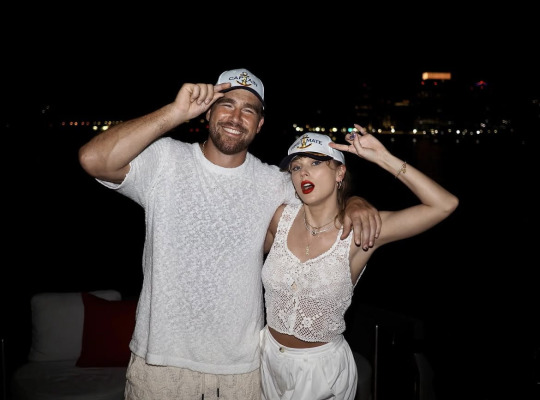
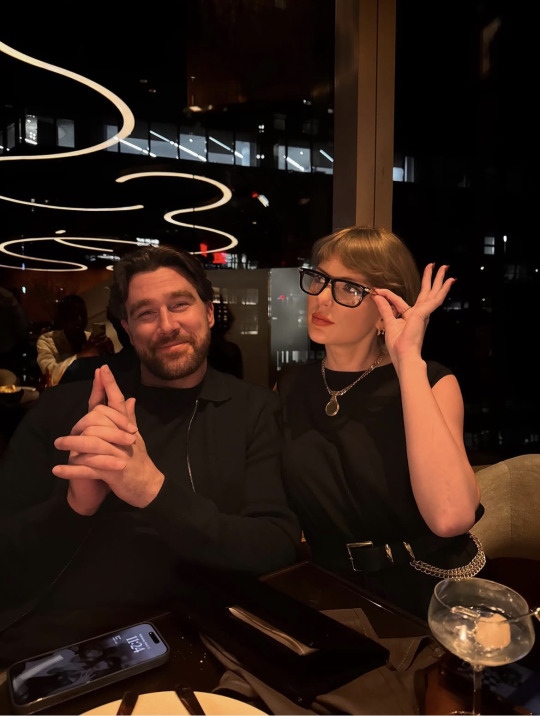
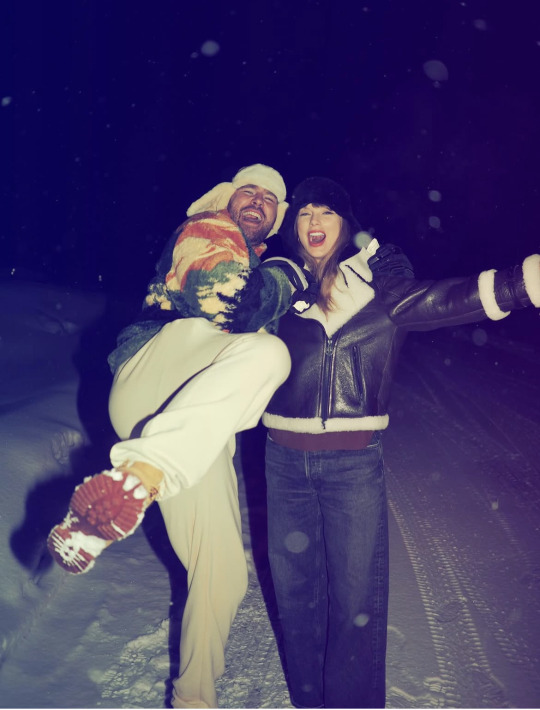

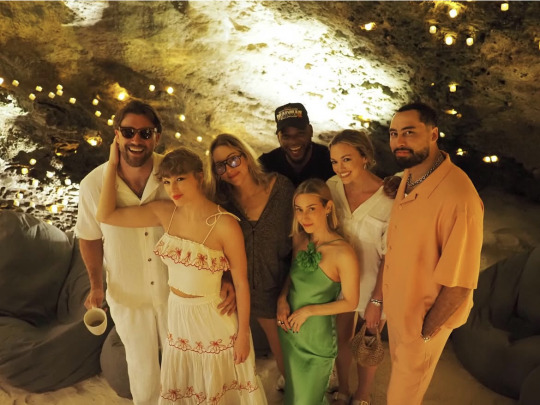
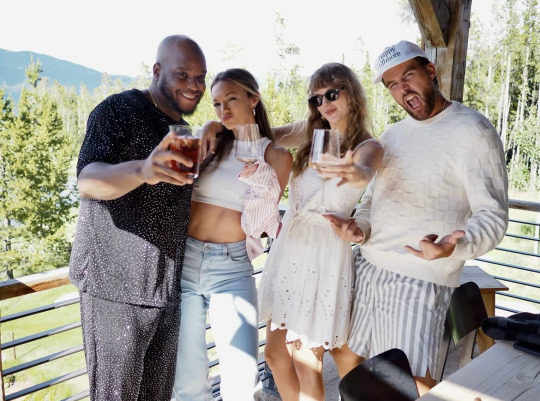

killatrav: Had some adventures this offseason, kept it 💯 (x)
1K notes
·
View notes
Text


I herald his beginning, I herald your end, I herald Galactus.
394 notes
·
View notes
Text
oh, it's hard to leave you (when i get you everywhere!)
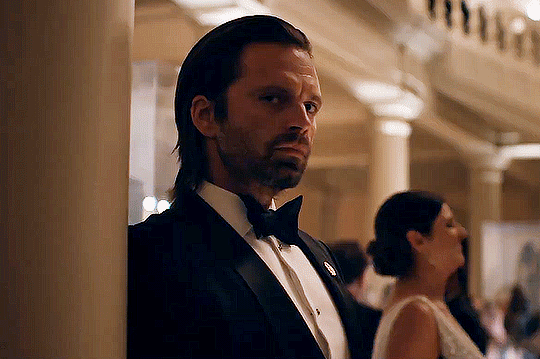
pairing: congressman!bucky barnes x pr manager!reader summary: you tweet one (1) mildly unhinged critique of congressman james buchanan barnes’ pr strategy—something about ghosting the press and weaponizing cheekbones—and three hours later he’s in your dms asking if you want a job. now you manage his social media, his public image, and occasionally his existential spirals. he’s got a metal arm, a rescue cat named alpine, and the digital instincts of a dad trying to facetime from the tv remote. somehow, against all odds, he’s good. earnest. dangerously hot. you're so screwed. word count: 10.6k content warnings: 18+ mdni, fem!reader, soft dom!bucky, sloppy make-out sesh for the win, fingering, oral (f!receiving), face riding, praise kink, unprotected sex, rough sex, size kink, creampie, use of pet names like sweetheart and pretty baby, unprecedented levels of yearning, overstimulation, multiple orgasms, unhinged tweets

You don’t mean to go viral.
You really don’t. It’s not a bit or a career move or a desperate plea to the algorithm gods. It’s just that you were in line for coffee at 8:47 a.m., hungover from exactly one and a half spicy margaritas (because you're a real adult now and your liver hates you), and the man in front of you was vaping indoors. You needed to direct your rage somewhere. That somewhere happened to be Twitter.
Well. That and the soft target of Rep. James B. Barnes.
Your actual tweet really isn't that scathing, in your opinion:
“Not to be rude before 9 a.m., but Rep. James B. Barnes has the digital strategy of a man who thinks ‘radio silence’ is the same as ‘messaging control.’ Ghosting the press isn't mysterious, it's lazy. And the Instagram? Sir, it's giving retired uncle who discovered portrait mode last week. You're hot, sure—but public goodwill isn’t built on brooding black-and-white cat photos and the occasional quote that reads like it was ripped from a thirteen year old's diary. Hire literally anyone.”
You hit post, tuck your phone away, and move on with your morning, which includes trying not to scream during a client call where a fitness influencer earnestly asks if she should “lean into a divorce arc.”
By the time you check Twitter again, it’s… carnage. In the good way.
The notifications are stacked like an avalanche. A dozen quote tweets, then a hundred, then you stop counting because your phone is hot to the touch and your Slack has stopped functioning. You’re about to text your best friend when you see it:
@RepBarnes:
Noted. Would you like to try fixing it?
You stare. Blink. Blink again. Surely not.
Surely the Winter Soldier, now U.S. House Representative for New York’s 9th Congressional District, is not quote-tweeting you like this is a casual Tuesday.
Surely the man who once jumped off a highway overpass and punched a terrorist in the face is not lurking on Twitter Dot Com past midnight, scrolling his name like a sad girl with an ex-boyfriend playlist.
You reread it.
Then again. And again. Your fingers are shaking a little, like you’ve had three too many shots of espresso, which—fine—you have.
You’re halfway through an existential crisis about how a minor PR manager can possibly be noticed by a former Avenger turned Congressman when your phone starts vibrating off the desk. Nina texts you first:
NINA
DUDE DUDE HE KNOWS WHO YOU ARE do you think he read your pinned tweet where you said you’d marry Thor in a Walgreens parking lot???
You don’t answer. You’re too busy spiraling. Because now your professional website is getting hits. And your LinkedIn. And, insult to injury, your ancient Tumblr blog from college, where you once posted a 2,000-word thinkpiece on how Steve Rogers is a metaphor for millennial burnout. You know this because someone found it and tagged you with a screenshot.
You’re spiraling when your phone pings again.
This time it’s not public.
@RepBarnes has sent you a direct message.
If you’re interested, I could use someone like you. NY/DC split. Health benefits included. Let me know.
You read it once. Then again. Then walk away from your desk, lie down on your kitchen floor, and stare at the ceiling like it might have answers. It does not. It has a water stain from your upstairs neighbor’s failed attempt at DIY plumbing. You feel that deeply.
You, who spent three years post-grad slowly circling the corporate America drain—clutching your Communications degree like it’s a winning lottery ticket while negotiating brand partnerships for YouTubers who think “millennial” means “anyone over 26”—have just been headhunted by Bucky Barnes.
You should probably be flattered. Or terrified. Or calling your mom. Instead, you fire off the only response that makes sense:
are u joking?
His reply comes five minutes later.
No. You’re good. And I’m very tired of people telling me to post more cat content.
You stare at your screen.
You should absolutely say no. This is clearly a trap. At best, a weird stunt. At worst, the kind of surreal pivot that leads to you being mentioned in Politico under “questionable staffing decisions.”
But also… your rent just went up. Again. Your clients are spiraling. You haven’t had health insurance that covers dental since 2021.
And Bucky Barnes wants to hire you?
You exhale. Then type,
i'll clear my schedule. when and where?
A beat.
Meet me in D.C. I’ll have coffee. You bring strategy.
You stare at that last part and—God help you—you start to grin.
You're pretty sure you’ve just accepted a job from the Winter Soldier.
.
Once upon a time, you had hopes.
Real, annoying ones. Back when you still believed in upward mobility and the promise of networking events with warm chardonnay. You were going to climb the ranks. Not to the top, necessarily—you were realistic, not delusional—but to a place with an actual title. "Director" maybe, or "Head of Strategy." Something crisp and important-sounding that could be printed on business cards without irony. You’d wear smart blazers and carry a leather tote that didn’t smell like stale granola bars. You’d have power lunches.
Instead, you’re three years out of grad school with an inbox full of “circling back”s, a calendar that reads like a sacrificial offering to the content gods, and a job that involves convincing lifestyle micro-influencers to stop posting QAnon-adjacent smoothie recipes.
You had dreams. Now you have bills.
Which is why the Bucky Barnes situation feels less like a win and more like a symptom. A brain glitch, maybe. You refresh your inbox. Again. You’ve been doing that for the last hour and a half. The DM is still there, as if it might disappear if you blink too hard.
You open a Google Doc. Title it “Project: Barnes?” with the tentative, quizzical punctuation of someone who is very much not okay.
And then, like any self-respecting PR person who has just been contacted by a former war hero turned sitting U.S. Representative, you type the most professional research query you can think of:
bucky barnes political platform site:gov
Then:
bucky barnes cat
And then, after five minutes of increasingly weird search results, you cave:
bucky barnes shirtless
For research purposes, obviously. To understand the optics. You are nothing if not committed to analyzing the full spectrum of a person's public persona.
(Also, look. It’s not your fault that James Buchanan Barnes is stupidly, distractingly attractive in a way that should be a federal offense. The man has the bone structure of a war-weary marble statue. The jawline of a vintage cologne ad. And don’t even get started on the arm—the arm—because that’s a whole separate thesis.)
It’s Wakandan tech, sleek and black with gold accents that catch the light like something out of myth. You’ve seen pictures of him at press conferences, sleeves pushed up, glinting like some kind of tactical Greek god. It is, objectively, an optics goldmine. Which makes it even more baffling that his current social strategy is “post like a cryptid and hope people like based on vibes.”
You learn that he’s been in Congress for just under six months. That he ran on a progressive platform with a heavy emphasis on veteran care, climate resilience, and “actually listening to the people,” which, yes, is vague—but less vague than the average politician, so that’s something. You find clips from a debate where he tells a super PAC-backed opponent, with all the calm menace of a man who once fought a Nazi on top of a train, “I didn’t survive a handful of wars to let people like you sell this country for parts.”
It’s not fair. He shouldn’t be allowed to be hot and principled and grumpy in a compelling way. That’s too many character traits. You’re fairly certain it violates some kind of congressional ethics code.
You click out of the tab. Open another.
Watch a video of him dodging a question on CNN with a non-answer so blunt it circles back around to being honest. He has a dry, clipped delivery. A little awkward. A little old. Not in a cringey, old-man way—but like he hasn’t quite caught up with the TikTokification of discourse.
You hate how much you want to fix it.
Your fingers twitch. You scroll through his feed. It’s mostly retweets of policy initiatives, local labor union updates, and cat pictures—grainy, candid shots of a very fluffy white feline with the disdainful elegance of old money and the personal boundaries of a cryptid. She’s usually perched somewhere she shouldn’t be: on top of his kitchen cabinets, wedged behind a stack of legislative binders, once half-asleep inside his empty duffel bag. Once in a while, he posts a weirdly poetic thought. Like:
Not all roads lead to war. But I remember the ones that did.
You stare at it.
It has thirty-two retweets, all from mutuals you know to be deeply online. One has responded “who’s running this account and do they need therapy.” Another has written simply: “sir.”
You breathe out a laugh.
You should be panicking. Or preparing. Or calling someone smarter than you. But instead you’re refreshing his feed and scrolling like a girl with a crush.
Which—no. Nope. Absolutely not. This is research. Professional curiosity. Intellectual rigor.
You check your calendar. Nothing but a call at four with your client who wants to rebrand herself as an “edible wellness guru” and refuses to define what that means. You sigh. Close the tab.
Then reopen it. One more scroll for the road.
In one photo, his cat is curled up in Bucky’s lap, a fluffy white loaf of judgement and chaos, her paw resting on his vibranium arm like she owns both it and the man it’s attached to. The caption reads:
She snored through my security briefing. I wish I could too.
Jesus Christ, you think. I’m in trouble.
.
You spend the next forty-eight hours overthinking everything.
Your research doc is now twenty pages long. You’ve compiled notes on his legislative record, his key voting blocs, public sentiment analysis, and—because you are fundamentally broken—a list of his most viral thirst tweets. There’s one that simply reads “he could kill me and I’d say thank you.” You are not proud to admit it made you snort.
You board the train to D.C. with your headphones in, your anxiety clutched to your chest like a carry-on, and your very best business casual. You don’t even read on the train. You just sit there and wonder what the hell you’re doing.
By the time you arrive, you’re exhausted from spiraling.
The coffee shop is in Capitol Hill—of course it is. Quiet and wood-paneled, with the kind of soft lighting that makes everyone look like they’re about to confess something.
You’re early. He’s not there yet. You order a black coffee and a croissant you won’t eat and choose the table in the back, where you can see the door.
Five minutes later, he walks in.
And yes, fine. It is a little cinematic.
James Buchanan Barnes in the flesh is not the brooding, hyper-composed figure from press photos. He’s rougher around the edges in person, like someone who never quite got used to peacetime. His hair is slicked back but starting to come undone at the edges. The navy suit jacket he’s wearing is slightly creased, like he’s been rolling up the sleeves and taking it off and putting it back on all morning. No tie. Just the white collar of his shirt open at the throat, exposing the soft brush of stubble across his neck and jaw.
God. This is so unfair.
His eyes land on you and something flickers—recognition, maybe, or skepticism. You can’t tell.
He walks over. You stand too quickly. Your chair makes a horrible screech.
“Hi,” you say, then—because you’re flustered and your brain is full of static—“I almost didn’t recognize you without the strategically vague tweets.”
His brow lifts, just slightly. The corner of his mouth pulls. Could be amusement. Could be confusion.
“You came,” he says, as if the possibility you wouldn’t had been very real.
“Of course,” you reply, forcing a half-smile. “I go where the digital crises call.”
He nods once, slowly. Watches you as you open your laptop and set your coffee down. It’s too quiet for a moment—the hum of the café, the hiss of the espresso machine, the clink of someone stirring sugar behind the counter. You pull up the notes you made at two in the morning while spiral-reading his press history, trying not to fidget.
“I figured,” you offer, “we’d start with a social audit. Clarify some core messaging, maybe put together a soft content strategy for the next two weeks. We’ll do a tone reset, pull the last six months of analytics, identify what’s actually landing—because no offense, but your engagement rates are being carried by your cat.”
A pause.
“I mean, I get it. She’s adorable. But still.”
He huffs something that could be a laugh, if it weren’t so dry. Then leans back slightly, the line between his brows easing as he studies you.
Then he says, slowly, like he’s still feeling out the words: “You actually know what you’re talking about.”
And you blink. “You thought I didn’t?”
He shrugs, glancing out the window for a beat before returning to you. “I kind of thought you were… just someone online. Making noise.”
You sip your coffee. “I mean. I am. But I also have a master’s in communication strategy and ten thousand hours of dealing with manchildren who think posting a thirst trap is a branding pivot.”
His mouth twitches. “Sounds promising.”
You smile. Tight. “So. What exactly do you really need help with?”
And just like that—you’re in it.
You expect him to start with a question. Or a joke. Or maybe something awkward and vaguely threatening, like “how do you know so much about me?” (You don’t. You just have Wi-Fi and a dangerous relationship with your search bar.)
But instead, Bucky leans back in his chair, crosses his arms, and says, “It’s just not working.”
You blink. “You’ll have to be more specific. What’s not working?”
“My comms strategy. My messaging. All of it.”
He sounds vaguely exasperated, but not angry. Just tired. You get the sense that’s his baseline. He gestures with one hand, the movement sharp and utilitarian. “I’m supposed to be building a digital presence that connects with people. Makes them trust me. Instead I’m getting tagged in memes about how hot I am.”
You nod, solemn. “To be fair, you do look like that.”
He doesn’t laugh, but he quirks an eyebrow like he’s maybe a little impressed you said it. “Thanks.”
You swallow the lump in your throat with a sip of coffee. It’s going lukewarm. “So what was the issue? Your team too old school? Too hands-off?”
He gives you a look that’s equal parts apology and confession. “I don’t really have a team.”
You blink again. “You… don’t have a team.”
“One guy. Used to run PR for a congressman from Montana. Thought hiring someone low-profile would keep things clean.”
You squint. “You’re a former Avenger. There’s no such thing as clean.”
“Yeah,” he says. “Starting to notice that.”
You press your fingers to your temples. “Okay. So let me get this straight. You have no digital strategy lead, no content calendar, no brand consultant, and you’re navigating one of the most publicly scrutinized jobs in America with a guy whose last success story was getting a local paper to stop calling his boss ‘the Beef Tariff Czar.’”
He shifts. Slightly. Doesn’t deny it.
You put your coffee down. Carefully. Deliberately. Then say, as diplomatically as you can:
“With all due respect, Mr. Barnes—this is a disaster.”
He meets your eyes. Dead-on. “That’s why I messaged you.”
It’s almost… earnest. That quiet, unflinching way he says it. Like he knows just how far in over his head he is. Like he doesn’t enjoy asking for help, but he’s smart enough to do it anyway.
That, more than anything, is what knocks you sideways.
Because the guy sitting across from you does not radiate “competent politician.” He’s stiff in the way people are when they’re always anticipating a fight. He looks like someone who’s only recently stopped treating doorknobs like potential traps.
But he also looks at you like he’s listening. Like he wants to get this right, even if he doesn’t know how.
And you hate how that pulls at you.
You fold your hands. Steady your tone. “If I take this job, I’m not just managing your Twitter. I’ll need full access—messaging, public statements, policy framing. You’ll have to be okay with me pushing back. Hard.”
He nods. “Understood.”
“And I’ll need to redo everything your current guy’s done.”
“I was hoping you would.”
You raise an eyebrow. “Including the website that looks like it was designed in 2007?”
A ghost of a smirk. “I designed that one myself.”
“Of course you did.”
A beat. Then—quietly, without the usual edge. “I didn’t expect to win. When I ran. It wasn’t about the campaign. I just thought… if I could stand up, maybe someone else would too.”
It’s not a speech. It’s not even polished. But it hits.
You sit with it for a second. Then say, “That’s the part people need to hear.”
He frowns. “What, the not-expecting-to-win part?”
“No. The rest. The standing up.” You pause. “You want to help. And that’s rare. It’s worth something. We can build on that.”
There’s a shift then, subtle but real. He straightens a little. Like your words have landed somewhere deep. Like maybe—maybe—you’re the first person who’s said that in a while.
You don’t say anything else. Neither does he.
But something’s settled between you. A quiet, unspoken agreement.
You’re in. Actually.
God help you.
.
Your first day working for Congressman James Buchanan Barnes begins with a minor existential crisis and a yogurt you eat standing up.
Capitol Hill is less glamorous than it looks on TV. A lot more beige. A lot more linoleum. Everything smells like government-grade carpet and desperation. You get stopped at security twice. First because of your laptop. Then because you muttered “kill me” under your breath in line and a very serious-looking man with an earpiece asked if you were making a threat.
You’re not. But it’s touch and go.
Bucky’s office is on the third floor of the Cannon Building. It’s functional in the same way a DMV is functional—technically operating, but held together by anxiety and one overworked assistant. The plaque outside his door reads:
REP. JAMES BARNES
New York’s 9th District
Inside, it’s… chaos.
Not loud chaos. Weird chaos. Subtle. Like someone tried to copy a normal congressional office from memory but forgot a few key details. There’s a framed photo of Brooklyn from the ‘40s. A desk with approximately forty-nine paperweights—no papers, just the weights. A bowl of wrapped Werther’s Originals. You are immediately suspicious.
Before you can process that, Bucky appears in the doorway, sleeves rolled up, tie in hand like he hasn’t figured out if he’s putting it on or strangling it.
“You made it,” he says. Deadpan.
“No thanks to Homeland Security,” you mutter, stepping inside.
He gives you the tour, if you can call it that.
There’s the bullpen (three desks, one of which has a sword leaning against it for reasons no one explains), a coffee station with a “don’t drink this, it’s poison” Post-it, and his actual office, which is larger than you expected and somehow still incredibly bare.
You spot a half-empty bookcase, a red file folder labeled “CRISIS?” and a punching bag tucked behind the door.
“Is that for stress relief or intimidation purposes?” you ask, pointing at the bag.
“Yes,” he replies.
The next hour is a whirlwind of introductions, vague directives, and increasingly unhinged email threads. His comms inbox is a minefield.
You get a badge, a desk, and a monitor that still has a Post-it from your predecessor that just says, Good luck, you’re gonna need it. You also learn that the thermostat in the office only has two settings: Arctic Military Base and Surface of the Sun.
By the end of your first day, your inbox has refreshed for the fifth time and you’ve flagged three crisis-adjacent threads—one involving a scheduling mix-up, one involving a meme account, and one involving a conspiracy theory about cyborgs in Congress.
Maybe, just maybe, this job might be more than you bargained for.
The next week is only slightly less chaotic.
Your—well, his, technically—first press briefing is scheduled for 2 p.m. sharp, but by 1:17 you’re already mentally preparing the post-mortem. You’ve seen the rehearsal footage, such as it was—him standing in front of his desk, arms crossed like a bouncer, muttering responses like they physically pained him.
When you gently suggested he try smiling, he looked at you like you’d asked him to perform open-heart surgery with a spoon.
“It’ll be fine,” An intern chirps, shoving a protein bar in your hand as they breeze past. “He does better under pressure. Like a reverse soufflé.”
“What does that mean,” you whisper, but she’s already gone.
You’re standing behind the curtain in a room that smells like too many folding chairs and not enough trust in government when he walks in, adjusting the cuffs of his shirt. No tie today. He says it feels like a leash. His sleeves are rolled with military precision, though. His hair’s slicked back. He looks more like a man going to war than one about to deliver a ten-minute statement on infrastructure funding.
“You ready?” you ask, clipboard clutched like a lifeline.
“No,” he says. “But I’ll do it anyway.”
You almost smile.
The press corps is already seated, eyes trained, pens poised. He walks out with the focus of someone trained to enter dangerous rooms. You can see the shift in him—quiet alertness, head high, every movement efficient. There’s still something a little stiff in the way he grips the podium, like he doesn’t fully trust it not to fall apart under his hands.
Then he starts to speak.
And damn.
Okay.
You hadn’t expected this.
It’s not polished. He stumbles over a couple phrases. Uses “ain’t” once. Drops a note card and mutters “shit” under his breath into a hot mic.
But he knows his stuff. Not just the numbers. Not just the bill. The context. The human angle. He tells a story about the neighborhood he grew up in, back when it still had corner shops and streetcar tracks. Talks about a single mom who wrote in last week about her building’s pipes freezing every winter. Doesn’t make promises—just outlines what he’s doing and what he won’t let happen again.
And it’s good.
It’s honest.
He doesn’t charm the press. He earns them.
You see it in the way pens pause halfway through notes. Phones lowered. Eyebrows raised. There’s a moment—a beat in the middle of a sentence—where he talks about reconstruction efforts in Red Hook and says, “We don’t need heroes. We need decent plumbing and warm classrooms,” and it lands like a punch.
You feel it, too.
By the end, they’re asking thoughtful questions. Real ones. He handles them with a dry kind of grace. Doesn’t deflect. Doesn’t lie. Says “I don’t know” more than once, but follows it with “I’ll find out.”
When it’s over, he steps backstage, exhales slowly, and immediately unbuttons the top of his shirt like it’s a reward.
You hand him a bottle of water.
He takes it with a nod and says, “Well?”
You blink. “You were… actually incredible?”
He raises an eyebrow. “That so shocking?”
“Yes!” you blurt, then soften. “I mean. A little. You’re not exactly a poster child for press-friendly vibes.”
He leans against the wall, sipping. “Yeah, well. I’m not a fan of the stage.”
“But you like the mission.”
He looks at you. And for once, doesn’t deflect.
“I like helping people. I like when things are fair. And if this is what I gotta do to make that happen…” He shrugs. “Then I do it.”
You file that away. Noted: Bucky Barnes does not enjoy politics, but he endures them for the sake of something bigger.
You offer, “You want to decompress? There’s a decent café two blocks away. You’ve earned, like, three cookies.”
He tilts his head. “You buying?”
“I work for the government now. I’m broke.”
“Fair,” he says. “I’ll buy the cookies.”
You walk the few blocks in relative silence, save for the traffic and your boots scuffing against the pavement. The café is small, warm, full of people with laptops and disillusionment. You order coffee. He orders a black Americano and two oatmeal raisin cookies, like a war crime.
“Don’t judge,” he says, catching your expression. “I like raisins.”
“Of course you do,” you mutter. “You probably eat Bran Flakes and think they’re spicy.”
He gives you a look over the rim of his cup. “Didn’t realize I hired a bully.”
You grin. “Not a bully. Just aggressively helpful.”
He snorts. And you sit there, in the quiet aftermath of his first real public win, watching him pull the napkin apart like it personally wronged him. There's something calming about it—like you’re both still wound a little tight, but not as tight as before.
You let the silence stretch a beat longer before speaking. “Can I ask you something?”
He glances at you. Shrugs. “You’ve already asked me worse.”
You huff a soft laugh. “Fair.”
He waits.
You roll your cup between your palms. “Why’d you hire me?”
There’s a pause. Not the kind that makes you nervous—just one that feels like he’s actually going to answer. Eventually. When the words are ready.
When he does speak, his voice is low, deliberate. “You were honest.”
You blink. “About what?”
“That tweet,” he says. “About me ghosting the press. Most people either kiss my ass or assume I’m gonna punch them in the face. You didn’t do either.”
You snort. “I did call you hot, though.”
A small tug at the corner of his mouth. “Yeah. That, too.”
Then, quieter, “You said what everyone else was thinking. But you said it like it wasn’t personal. Just... necessary.”
You don’t speak. You’re not sure he’s done.
“I’ve had a lot of people tell me who I am. What I’m supposed to be. Some of them were wrong. Some weren’t. Doesn’t mean I liked hearing it.”
His fingers tap against the cup once. Twice. “But you were right. I didn’t have a handle on any of this. The job, the people watching, the way it all gets twisted. You called it out.”
“And that worked in my favor?” you ask, half-joking.
His gaze flickers to yours. “You didn’t lie to me. That means something.”
It lands heavier than expected.
You look down at your lap. Then, after a second: “I thought you were gonna say it was because I tweeted about your cat.”
He huffs. “That helped.”
You smile, and when you glance back up, he’s watching you. Not like he’s searching for something. More like he’s found something and isn’t sure what to do with it.
“I could tell that you'd keep me grounded,” he says.
It’s simple. Uncomplicated. But your chest goes tight anyway.
��Thanks,” you say softly.
“Don’t get used to the compliments,” he mutters, sipping from his long-cold coffee. “I’ve got a reputation to maintain.”
You nudge his shoulder. “You mean the mysterious, broody one?”
He arches a brow. “Better than ex-assassin with a PR manager.”
“Hey,” you say, mock offended. “I'm rebranding you.”
And this time, his smile is small—but real. The kind that says you’re staying.
.
Briefings, memos, social strategy calls take up the next month. You update his official bio, overhaul his campaign site, start a new newsletter format that doesn’t look like it was designed in the throes of dial-up internet. You start drafting tweets in his voice, but you’re surprised at how often he wants to write them himself.
Sometimes he sends them to you first, via email, labeled “draft?” and rarely punctuated.
The kids who emailed about lunch debt were right. They shouldn’t have to be the ones fixing it.
You write back:
it’s missing caps and grammar and polish …it’s also perfect. i hate you a little
He replies ten minutes later:
Good. Keep hating me. Makes your edits stronger.
You start seeing him more. At first, it’s meetings. Then lunch breaks. Then you’re just… there.
In his office while he sorts through constituent letters. Sitting across from him on the Capitol steps, scrolling through your phone while he mutters about zoning regulations and offers you the second half of whatever sandwich he’s picked up from the Hill café.
One Thursday, around 6:45 p.m., you’re still at the office. Your laptop’s overheating. Your shoulders ache from the stress of trying to politely tell a PAC liaison that no, Bucky will not be attending the “Patriots for Policy” fundraiser, and no, their “Star-Spangled Selfie Station” is not an appealing incentive.
You lean back in your chair, eyes closed, and say out loud, “If one more intern sends me a Google Doc titled ‘shitposts to own the opposition,’ I’m going to walk into traffic.”
“That bad, huh?” comes Bucky’s voice from the doorway.
You open one eye. He’s holding two cups of coffee. It’s late. His sleeves are rolled again—he does that a lot, like he’s always preparing to do something with his hands. He sets a cup on your desk.
“It’s decaf,” he says. “I’m not trying to kill you.”
You sit up. “Decaf? Wow. You are learning.”
He doesn’t smile, but the corners of his mouth twitch. “Baby steps.”
You sip. It’s good. And quiet stretches out between you. The lights overhead buzz faintly. Someone’s laughing two rooms over. The city is folding in on itself outside, another day’s worth of bad traffic and moral compromises settling over D.C. like a weighted blanket.
.
Another few months pass in a rhythm that starts to feel dangerously like routine.
He insists on responding to every constituent letter about veterans’ benefits himself, even the ones written in glitter gel pen. One morning you find him on the floor of his office, surrounded by stacks of envelopes, Alpine curled up on a pile marked “urgent.”
“Just scanning,” he says, gesturing vaguely at the chaos. “She likes the important stuff.”
You start to learn things about him. Little things, dropped like breadcrumbs.
He hates cilantro. Keeps a dog-eared copy of All the King’s Men on his desk. Organizes his paperwork with military precision but leaves mugs half-finished all over the office. He’s still learning to take a break during the day. Sometimes he doesn’t.
One evening, while you’re both trying to pick a header image for the new landing page (he hates stock photos, insists they feel like “hollow propaganda”), he mutters, “I used to think if I could just disappear, I’d stop hurting people.”
You freeze. “And now?”
He doesn’t look away from the screen. “Now I’m trying to build something instead.”
Your throat tightens. You change the subject. You always do.
The tension between you simmers. Unspoken, unnamed. He starts saying your name more often. You start noticing when he does.
He always says it like it matters.
One Friday, he brings you a donut. Doesn’t mention it. Just leaves it on your desk and walks away like a man who doesn’t realize small gestures are dangerous.
You stare at it for a full minute before a staffer walks by, clocks the look on your face, and mutters, “Oh, you’re gone-gone.”
You pretend not to hear her.
One night, you find yourselves outside a community rec center after a Q&A event, both of you too wired to go home. You walk a few blocks together, hands brushing once. Neither of you acknowledges it.
“You ever think about leaving?” you ask, staring up at the streetlight.
“Sometimes,” he says. “Then I remember I already ran for almost fifty years.”
You laugh. He looks over, soft.
And then, quietly, “Not sure I’d want to go anywhere without you anyway.”
You blink. “You mean… as staff?”
He hums, like he’s choosing not to answer that.
He looks at you too long sometimes. Like he’s memorizing you. You assume it’s habit—old instincts. Soldier’s reflex. You don’t let yourself think about what else it could be.
Because it can’t be. He’s your boss. You’re his PR handler. This is all fine. Normal. Entirely professional, except for when he looks at you like that.
Which is how it builds—slow, steady, suffocating.
Until one night he’s sitting too close. You’re laughing too hard. His hand brushes your knee, and he doesn’t move it. And you still don’t realize.
Not really.
.
It’s a Tuesday night.
Well—technically Wednesday. 1:12 a.m., according to your phone. Your apartment is dark except for the glow of your laptop and the soft blue from the streetlamp outside your window. You should be sleeping. Instead, you’re re-reading policy notes and trying not to think about the email from your landlord marked “urgent.”
The city is quiet, but your mind is loud.
Your phone buzzes.
BUCKY
Are you awake
No punctuation. Of course. You stare at it. It’s not like him to text unprompted—especially not at this hour. You wonder for a second if it’s a mistake. Or if something’s wrong.
You call him.
It only rings once.
“Hey,” he says, voice rough with sleep or something that isn’t quite.
“You okay?” you ask, softly.
A pause. “Yeah. Just… couldn’t sleep.”
You settle back against your pillows. “Bad dream?”
He doesn’t answer right away.
Then, quietly. “More like a bad memory.”
You let the silence stretch, but you don’t fill it. You’ve learned that about him—he’s not afraid of quiet. He just doesn’t always know what to do with it. You hear a faint rustle, like he’s sitting down, maybe at his kitchen table. Maybe the couch. Maybe the floor. He’s the kind of guy who sits on the floor without thinking about it.
“You want to talk about it?” you ask.
“Not really.”
You nod, even though he can’t see it. “Okay.”
A breath. Then, with a strange kind of gentleness: “You ever feel like you’re… still in the middle of something, but everyone else thinks you’re past it?”
You exhale, slow. “Yeah. All the time.”
Another pause. And then: “I thought when the shield went to Sam, that was it. That was my end point. Like I’d done my part and now I could just… blend into the wallpaper. Fix things. Be useful. Pay back some debt I can’t ever really name.”
He exhales.
“But I still wake up and feel like I’m waiting for orders.”
Your throat tightens.
“I’m not a soldier anymore,” he says, like he’s trying to convince himself. “I know that. But sometimes it feels like I lost the war and no one told me.”
You sit with that. It’s a kind of grief, what he’s saying. The loss of purpose. Of identity. You think about what it means to carry history in your body. To be made of violence and guilt and memory, and still try to build something from it.
“You’re not wallpaper,” you say. “And you’re not a soldier. Not unless you decide to be.”
A faint, surprised sound. “You think I can just choose who I am now?”
“I think that’s what healing is,” you say. “It’s not forgetting. It’s choosing who you are in spite of it.”
It’s quiet again. But softer, this time.
“Thank you,” he says, and he means it.
There’s a beat.
Then he says, “You want to come over?”
Your heart stumbles. “Now?”
“I just…” he trails off. “I don’t want to be alone.”
You hesitate. Not because you don’t want to. You do. Too much, maybe.
“I’m in sweatpants,” you warn.
“I don’t care,” he says. “I’m in worse.”
.
Which is—not fair.
He’s in flannel pants and a faded Brooklyn Public Library tee, hair damp like he just stepped out of a shower, like this isn’t his worst week in office or the worst day in months. He looks too human. Too close. Not like Congressman Barnes, not like the Winter Soldier—just like a man who lives here. Alone.
“Hi,” you say, because you’re a coward with a communication degree.
“Hey,” he replies, voice low.
He steps back. You step in.
You move past him. He doesn’t touch you, but he lingers close as you settle onto his couch. There’s a record playing low in the background—something instrumental. Maybe jazz. Maybe something older. He sits next to you. Not quite touching, but near enough that you feel it.
Neither of you says much at first.
You sip the tea he makes you. Let your shoulders drop. And after a while, you’re both leaning back, side by side, staring at the ceiling like maybe it’ll explain something.
“I don’t let people in here much,” he says, out of nowhere.
You glance at him. “Why not?”
He shrugs. “Used to be a habit. Kept things safe. Controlled.”
“And now?”
He looks at you. Really looks. Like he’s cataloguing something important.
“I trust you."
The silence sharpens.
You feel it—somewhere between your chest and your breath and the skin of your palms, warm where they rest against your knees.
He turns toward you, like he’s going to say something. His thigh brushes yours. Your heart skips.
You say his name. Soft.
“Bucky.”
He leans in. Slow. So slow it hurts. His eyes flicker to your mouth.
And then—
He stops.
You’re close enough to feel the warmth of his breath.
Close enough to break.
But he doesn’t kiss you.
He just sits there, tension in his jaw, fingers curling against his leg like he’s holding himself back.
“I don’t want to mess this up,” he says, barely a whisper.
You nod. You understand.
.
You don’t sleep well that night. You don't even know how you got home.
Not because anything happened—and maybe that’s the problem. Something almost did. Something close enough to taste. But close doesn’t keep you up at night. Hope does. Ambiguity. The memory of his breath near your cheek, the exact second he pulled away, and the way your name sounded in his mouth just before it.
You wake up tangled in sheets that smell like lavender detergent and stress. Your shoulder aches from the way you curled in on yourself, as if pretending sleep would solve the question of him.
It hasn’t.
So you do what you always do: you compartmentalize. Ruthlessly. Viciously. Like a goddamn professional.
You slap concealer under your eyes, burn your tongue on gas station coffee, and tell yourself that you’re not thinking about Bucky Barnes. You are not thinking about how he almost kissed you. How his hand hovered at your knee like a promise he wasn’t ready to make. How you wanted him to make it.
No. You’re thinking about agenda items. Press follow-ups. Intern drama. Your inbox, which has gone feral overnight.
You’re halfway through drafting a media roundup from your phone when your car buzzes with an intern's name.
You answer on instinct. “Hey. Yeah, I’m on my way in—”
“Have you seen the op-ed?” they cuts in.
Your fingers still on the steering wheel.
“I—what?”
They don't wait. “I’m sending it now. Check your messages.”
You pull into a spot on the shoulder, the coffee cup sloshing as you brake. Your phone dings.
The link stares back at you. Your thumb hovers.
You already know it’s going to be bad. You can feel it in their voice. In the silence after their breath. You tap anyway.
And there it is.
Is the Winter Soldier Still Lurking Beneath Congressman Barnes?
It’s from a major outlet. Not a fringe blog, not some anonymous account online. It’s written by a seasoned journalist, someone who’s covered politics for two decades. The tone is surgically polite. It doesn’t outright accuse him of anything, but the subtext is razor-sharp: can a man with his past truly be trusted with power?
There’s a pull quote in bold, center-page:
“A reformed weapon is still a weapon. No amount of legislation can erase that history.”
The rest of the article is worse.
It dredges everything. Not just his Hydra years, but the killings. The photo evidence. The old footage. The Wakandan reprogramming is mentioned—briefly, half a paragraph, like it’s a footnote in a larger narrative of violence.
The author's polite language makes it more brutal. Less a hit piece and more… a thesis. Something cold. Inarguable.
You call him. He doesn’t answer.
You call again. Still nothing.
So you go to his apartment.
Bucky answers the door in that old gray sweatshirt and a pair of worn sweatpants that could belong to any decade. His hair’s half-tied, his mouth set. No smile, but no walls up either. His eyes are dark. Tired in a way that goes bone-deep.
He steps aside and lets you in. You don’t say anything about how he looks. You just take off your coat, make yourself at home, and sit down at the kitchen table.
The place is clean, quiet. Too quiet. Alpine is curled on the armrest of the couch like she’s keeping watch.
“I didn’t read it,” he says eventually. “Didn’t need to.”
“It’s bad.”
He nods.
He doesn’t sit. Just stands there, arms crossed, head bowed like he’s waiting for a verdict.
“You’ve been through worse,” you say. “This is—politics. It’s dirty.”
“It’s not about politics,” he replies, voice flat. “It’s about who I used to be.”
He says it like a fact. Not even bitter—just exhausted.
“I spent so long trying to fix things,” he continues. “Make it right. Every day, I get up and try to be something new. Someone new. And it doesn’t matter. All it takes is one article, one photo, and suddenly I’m the fucking Winter Soldier again.”
His fists are clenched now. You can see the tension in his frame, the way he’s holding himself together like it’s a full-time job.
“They didn’t say anything that isn’t true,” he adds. “That’s the worst part.”
You stand. Cross to him slowly. Carefully. He watches you with that guarded look he gets when he’s bracing for a hit that’s already landed.
“They used the truth to tell a lie,” you say. “You’re not that person anymore.”
“Then why does everyone keep seeing him?” His voice cracks on the last word. It shatters something in you.
You don’t know what to say. Not right away. Because it’s not your job to fix what was done to him.
But maybe it’s your job to remind him what’s changed.
So you touch his arm. The metal one. He flinches—but only for a second.
“You said you didn’t read it,” you say gently. “So you didn’t see the comments.”
His brow furrows.
“Thousands of people,” you say. “Calling it a smear job. Defending you. Saying they trust you more than half the people in office. Veterans. Civilians. Kids who look up to you. People who believe in second chances because of you.”
You feel the shift before you see it. His shoulders slacken, just slightly.
“You’re allowed to be upset,” you add. “You’re allowed to be angry. But you’re not alone in this.”
He looks at you then. Really looks. And whatever wall he was holding up—whatever mask he puts on for C-SPAN and strategy meetings—it drops.
His voice is rough when he finally says, “Can you stay?”
“Yeah,” you say. “Of course."
You stay right where you are—your hand still resting on metal that hums faintly beneath your fingers, warm from him. He’s quiet, but not calm. Not really. There’s tension in the way he breathes, in the slight tremor running down his arm. Like his body still remembers how to brace for impact, even when it’s just words.
Minutes pass like that. Long enough for the quiet to settle around you. For Alpine to leap silently onto the sill and stare out like she’s keeping watch for both of you.
Then he shifts—just slightly—and the couch creaks under the movement. He leans forward, elbows on knees, head bowed. The line of his spine curved like it’s bearing more than just his weight.
“Bucky,” you say, tone softening. “Talk to me.”
He’s not looking at you. His gaze is on the floor. Like if he meets your eyes, it’ll all unravel.
“I say or do one wrong thing,” he says, “and suddenly I’m a threat again.”
That last part is barely above a whisper.
You pause. Let the silence stretch.
“Hey,” you say, carefully. “You’re not a threat. You’re a congressman.”
He lets out a dry laugh. “That doesn’t mean anything.”
“I don’t know how to do this without screwing it up,” he says.
“Then let me help,” you say. “That’s what I’ve been trying to do, Bucky. Every day.”
That’s when his eyes meet yours—really meet them.
“You always come when I need you,” he says.
It’s a simple sentence.
But it lands like a match dropped in a dry field.
You stare at him. His face. The way his hair’s falling loose at the front. The soft curve of his mouth, the line between his brows, the glow of his vibranium arm in the lamplight—gold against black against skin.
You stand, like you’re going to fetch water or pace or do something, but you don’t make it far. You’re near his bookshelf—he’s got a handful of novels, mostly well-worn, a few classics. One spine is cracked down the middle. Another’s bent in half. You reach for one, just to touch something, ground yourself.
“You read a lot,” you say, just to fill the space. Just to breathe.
“Yeah,” Bucky murmurs, and the sound of his voice—that low rasp, Brooklyn tugging at the edges—rakes down your spine. “Helps. When my head’s loud.”
“What’s your favorite?”
There’s a pause.
Then, quietly: “You.”
You blink.
“You,” he says slowly, “you walk into my life and it’s like someone hit the off switch on the noise. Like there’s finally room to think again. To want things.”
Your throat goes tight.
He swallows. You hear it. Feel it.
“I didn’t mean to—” he stops, drags a hand through his hair, fingers brushing over the back of his neck. “I didn’t plan on hiring you. Thought if I kept it distant, maybe I wouldn’t…”
You glance over your shoulder. He’s watching the floor like it holds answers. His jaw is tight, that line above his brow catching the lamplight. He’s flushed high on the cheeks. His hair is curling a little from the heat of the day. It softens him.
You can’t stop looking.
“Wouldn’t what?” you ask.
“Wouldn’t get attached.”
The words fall out of him, too quick, too raw. His accent thickens when he’s like this—unguarded, unraveling.
He looks up at you then. And you swear—swear—you’ve never seen anyone look more exposed.
“I think about you,” he says, voice hoarse. “All the damn time. Your voice. The way you talk when you’re excited. The way you wrinkle your nose when you read something stupid. And I try—believe me, I try—not to want any of it. Because you work with me. And you’re good. And I don’t want to drag you down with my shit.”
“Bucky—” you start, but it breaks apart in your throat.
“But you just kept coming. And you’re kind. And smart. And funny in a way that makes me feel like I’ve been asleep for years. And now I sit in meetings half-listening because I’m wondering if you’re cold. Or if you ate. Or if you still think I’m some idiot with a shiny arm and bad instincts.”
You’re already turning. Reaching for him.
His eyes are so blue. Tired. Beautiful. Like storm glass worn smooth.
And his mouth—God, his mouth—is parted, breathing shallow, like he’s already halfway to ruin.
“I don’t know how to stop,” he whispers.
You don’t want him to.
So you close the space, press your mouth to his like it’s the only thing that makes sense anymore.
He answers in kind. Gentle at first—so careful—but then hungrier, hands finally finding you, clutching like maybe you’re real after all. Like maybe he gets to keep you.
His hands find your waist, one warm, one cool. He breathes you in like it’s the first breath after surfacing. You hold onto him, to the solidness of him, to the truth in everything he just said.
When you part, you rest your forehead against his, breathless.
“I didn’t plan on you either,” you murmur. “But I want this too.”
He opens his eyes. And there’s something there—tentative, but real. Hope, maybe.
You kiss him again, slow and sure, and this time, you don’t stop.
The kiss deepens, and you feel it — the tension of months unspooling all at once. The press briefings, the late-night calls, the shared silences. It’s in the way his mouth moves against yours, all reverence and restraint barely holding.
Then restraint snaps.
He groans into your mouth, low and rough, the sound vibrating through your chest. One hand slides to your waist, the other cradling the back of your head, fingers threading into your hair with a kind of reverence that borders on desperate. You gasp when your back hits the edge of the bookshelf, books shifting and thudding behind you. His body presses close, firm and solid, muscle molded to muscle.
You don’t breathe. You inhale him—his scent, his heat, the way his tongue strokes into your mouth like he’s trying to stake a claim.
Your hands are greedy, curled into the soft cotton of his shirt before they slip under, dragging over warm skin and the defined ridges of his back. He shudders, hips pressing forward, and the answering moan that slips from your mouth is embarrassingly loud.
His mouth moves to your throat, hot and open, tongue dragging over the place your pulse stutters wildly. He kisses there once, then again, a third time just to hear the way your breath catches.
The shelves dig into your back, but you don’t care. His mouth is on your throat now, slow, deliberate, like he’s trying to memorize the shape of your pulse.
“Bucky,” you whisper.
His breath stutters. His forehead rests against your jaw for a second, and his voice is rough when he speaks.
“You have no idea,” he murmurs, lips brushing your skin. “How long I’ve wanted this.”
Your breath catches. Your hands grip his hoodie like you’re afraid the floor might drop out. There’s a pause—something delicate in the air—and then you say, just to ground yourself:
“Wow. That almost sounded like a line.”
He pulls back just enough to look at you. Eyes dark, lips kiss-bruised. And then—finally—a real smile. Crooked. Devastating.
“You think I say that to everyone I push against my bookshelf?”
You grin. “I don’t know, Barnes. You’ve got a lot of books. Could be a whole system.”
He laughs. Really laughs. And then kisses you again, harder this time, a groan low in his throat when your hands slip under the hem of his sweatshirt. Skin meets skin and he makes a sound that short-circuits your brain.
Somehow, you make it upstairs.
It’s clumsy and desperate in the best way. A trail of clothing, soft gasps, hands mapping territory that’s been off-limits for far too long. He kisses you like you’re something precious and half-forbidden, and you can feel it in every press of his mouth, every whispered praise against your skin.
"Sweetheart, you're killing me," he groans while pressing those lips, those fucking lips, against your collarbone. "Need you to tell me this isn’t a dream.”
By the time you hit the bedroom, you’re breathless. Dizzy. Grinning like an idiot.
And Bucky?
He’s looking at you like he’s just figured out the world’s best-kept secret.
You barely hit the mattress before he’s on you again, mouth dragging down your neck, hands urgent but careful. Like he’s cataloguing every inch of you, filing it away somewhere behind all the noise. His vibranium hand slips beneath your shirt, cool at first but quick to warm against your skin, gliding up your ribcage with reverence that makes you shiver.
“You okay?” he murmurs, breath warm against your cheek.
You nod, maybe too fast. “Yeah. Just—processing.”
He freezes. “Processing what?”
“That I used to mock your social media presence,” you whisper, grinning up at him. “And now I’m about to get railed by the human embodiment of a Roman statue.”
His laugh is choked and surprised. “Jesus.”
“What? You set yourself up for that.”
He drops a kiss to the hinge of your jaw, then your neck, then lower—his stubble scraping just enough to make your breath catch. “Remind me to fire you later.”
“You can’t afford me.”
“Not true,” he says, one hand sliding up the back of your thigh, warm and sure. “You’re already here.”
You open your mouth for a reply, but then his mouth is on you again—tongue tracing a line down your collarbone, fingers tugging at your waistband like he’s been waiting forever.
“Tell me if anything’s too much,” he says, voice low and serious at your ear. “Or if I—”
“You’re not,” you breathe. “You’re perfect.”
That earns you another groan, and then he’s kissing you again, deeper, tongue sliding against yours with filthy precision. You feel him smile against your mouth when you gasp, hands tangling in his hair, thighs bracketing his hips like you were built for this. Built for him.
Clothes disappear in pieces. His sweatshirt, your shirt, the rest in a tangle neither of you cares enough to untangle. And then it’s just skin. Heat. The stretch of him over you, under you, hands braced, mouth hot on your jaw, your throat, your chest. He takes his time.
"Bucky," You whisper, searching for the right words. "I want you inside me. Please."
He pushes out a sound akin to pain between his teeth. "Getting there." So impatient, goes unsaid.
The moment his hand falls in between your legs, digging past soft cotton and lace, where you're dripping and soft and needy for him, you don't think you'll ever, ever have enough of him. He's slow, at first, just bordering on exploratory. Stroking the pads of his fingers through your wetness until he finds your clit—oh, fuck—and goes to town, making you moan and clench around nothing.
"There you go. That's it," He coos. "You're doing so good."
You close your eyes, his hand pressing in deeper, harder, finding just the right rhythm to drive you insane, switching between your clit and your entrance until you're going mad. Then you hear him spit, the sound obscene and dripping against your skin—then, a slap. "Oh my god," You murmur. "Oh, fuck."
"You're so wet," His brows furrow, like he can hardly believe it. Acting like he's not sinking his fingers inside of you, stretching you open with one, two fingers. "Soaked. Like I knew you would be, god. You're so tight and I—I bet you'd feel better around my—"
He hits a spot that makes you keen, fast and rough and fucking you open. "Yes, yes, oh my god, please—"
"There?" His breath fans across your cheek. "Right there, huh?"
You nod, delirious and breathless and you black out the rest of the world, lost in the way he looks at you like you're the best damn thing in the world. You clench once, twice around his fingers until you're at the brink and—
Come on my fingers, come on, sweetheart.
And who were you to resist?
For a moment, you just lay in the aftershocks, his fingers granting you enough mercy to slip out. You think that maybe he'll give you a break, maybe just for once second, but then his whole body shifts downwards, momentarily leaving you confused, and then his breath fans across your thighs—"Just want a taste."
Those four words cause something in you to snap.
His mouth is sloppy and hot and wet, more focused on cleaning you up and licking up the remnants of your orgasm, leaving your clit sorely, sorely alone in a way that's too purposeful. In a way that has you bucking against the soft stubble of his face, desperate for any kind of stimulation.
It doesn't even seem like he's doing it for you, it's like he's doing it for himself. But then you beg and whine, the words reverberating in your throat, "Bucky, please—higher, please, baby, I need you—"
A graze of his teeth and a sharp, tugging suck around your clit then and you cum again. Shaking and sighing and falling apart in his mouth.
When you look down, you can see just how much of a mess you've made, his face glistening with you, even in the dark. And he's looking at you so earnestly, so sweetly, like you've just given him the whole entire world.
"Do you—do you think you can take more?" His eyes look at you, filled with concern, and that's all you need for your legs to start waking up again. "I didn't—I dind't bring a condom and I—"
"I'm clean and I'm on the pill," You smile, lopsided and silly until he's mirroring yours, like he didn't just wrench the two best orgasms of your life out of you. Like he's not about to do it again. Just the way you like it. "And I want you to cum inside me. I wanna feel it. Shut up and get over here."
Bucky clucks his tongue, ever the dutiful man. "Yes, ma'am."
There's a moment—and then he's slotting the head of his cock into your entrance and you try not to be overwhelmed. He's hard and heavy and thick in a way you've never really experienced before, and for a minute, your brain short-circuits, in disbelief. You're doing this. You're really doing this. And suddenly, his cock goes all the way inside you with a pained groan.
His first thrust against you is messy, his hands having to spread your legs wide until you're arching against him. "Jesus, you're so—tight."
Then he's thrusting back in, his hands solid and heavy against your hips, not necessarily like a hammer, but in a way that makes your eyes roll back, slow and steady that you can feel every vein on his cock, lighting you up and finding places that not even your vibrator's been able to reach before. It's mind-numbing, it's relentless, it's perfect.
"Good girl," He whispers, pressing kisses up your neck to soothe the pressure of him inside you. "Taking me so well."
And then, like a reward, his vibranium hand leaves its place on your hip and starts caressing your clit, large fingers made impossibly gentle and finding a rhythm that parallels the way he ruts inside you.
"You're so good to me, so sweet," His words land like a sucker punch, and it makes you clench tighter, his pace faltering just the slightest bit. But he keeps going. "Always looking at me like that, don't know what you do to me, don't know how I can go without this. So much better than my dreams. Fuck."
"Can you come again for me? Pretty baby, can you do it again?"
It takes a harsh, rough swipe against your clit until you arch off the bed, eyes clenched shut and mouth wrenched open in a whine, and you bear down, coming for the third time that night.
And he's right there behind you, it doesn't take long before he speeds up, getting more frantic and desperate, and oh—he's shoving himself inside you as deep as he can go and you can feel him pulse, aching—"God, I love you. I love you so much, take it all for me."
You collapse underneath him, spent and so, so full. So perfect.
.
You go viral again.
Not for a tweet this time, but for a thirty-second clip someone posted from a town hall two weeks later—Bucky leaning in to answer a kid’s question about public transit, earnest as ever, saying something about “freedom meaning more than just car ownership,” with Alpine meowing in the background because she’d escaped her carrier under the table.
The quote is fine. Thoughtful, even. But it’s the look he gives you afterward—off-camera, off-script, soft in a way that has no business being soft—that turns the internet into a firestorm.
The caption?
sir. control yourself. your pr manager is right there.
You wake up to three missed calls, four texts from Nina (two of which are just screaming emojis), and one from your mom:
call me when you’re up
You do. Because you are a good daughter, even when half-asleep and mostly buried in a man’s too-soft duvet that smells like cedar and coffee and very recent sex.
“Morning,” your mom says, casual, like she didn’t text you three times in a row at 6:13 a.m. “How’s the job?”
You blink. “The—job?”
“Yes, the job,” she says, like it’s the most obvious thing in the world. “The one you got after insulting a congressman on the internet.”
You glance over at said congressman, currently shuffling out of the bathroom shirtless and towel-damp, rubbing his head with one hand while Alpine chirps at his feet like she owns him. Which she does.
“Uh,” you say, eloquently. “It’s going… well.”
“Good,” your mom replies. “You should call your aunt. She saw him on TV and keeps asking if he’s single.”
“Mom.”
In the background, a faint beeping. “Gotta go. Someone’s coding. Love you!”
The line goes dead.
You flop back into the pillows, groaning into Bucky’s comforter like it can absorb your entire soul.
“Everything okay?” he asks, voice still rough with sleep.
“Yeah. My mom thinks we’re married now.”
He raises an eyebrow. “We’re not?”
You shoot him a look. He grins.
Then, like it’s nothing: “What are you up to today?”
Technically, he’s your boss. A sitting congressman. You manage his image, his agenda, his occasional tendency to go off-script and say things like “burn it all down and start over” to a room full of journalists.
But now he’s shirtless in grey sweatpants, handing you coffee with Alpine perched on his shoulder like a parrot, and asking you to stay.
Not just for breakfast. For the day. Maybe longer. Maybe always.
It shouldn’t hit you like it does. But it does.
“You’re assuming I can concentrate,” you say, taking the mug like it’s a peace offering. “In your bed. With you. Shirtless. Existing.”
He smiles—that rare, lopsided thing he gives you when he’s caught somewhere between amusement and something gentler. “You’ve worked through worse.”
“True,” you mutter. “Once wrote an op-ed from a TikTok house while one of my clients sobbed over a brand deal and a frat boy tried to deep-fry a toaster.”
“See?” He leans down, presses a kiss to your temple like it’s just another part of your morning routine. “You’ll be fine.”
You look at him. At the man with a metal arm, a rescue cat, and a city full of people who expect him to change the world.
And he’s looking at you like you’re the thing that matters.
You exhale. “You’re lucky I believe in workplace flexibility.”
“Is that what this is?” he says, already walking toward the kitchen, voice full of barely contained laughter. “Workplace flexibility?”
You grin into your mug.
God help you, you’re in so deep.
You open your laptop from the warmth of his bed. Bucky pads away, Alpine trailing behind him like a tiny, loyal shadow. You draft emails. Sip coffee. Watch sunlight crawl across his floors. Like this was always where you were meant to be.
6K notes
·
View notes
Text
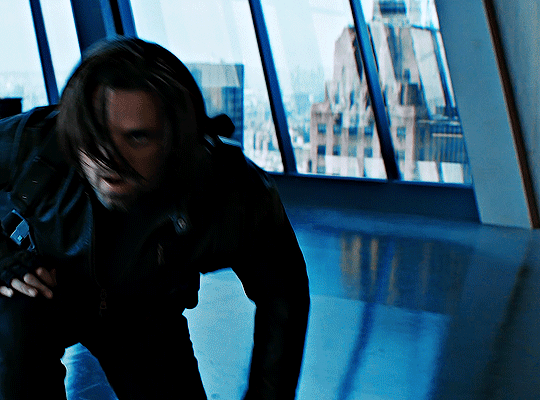
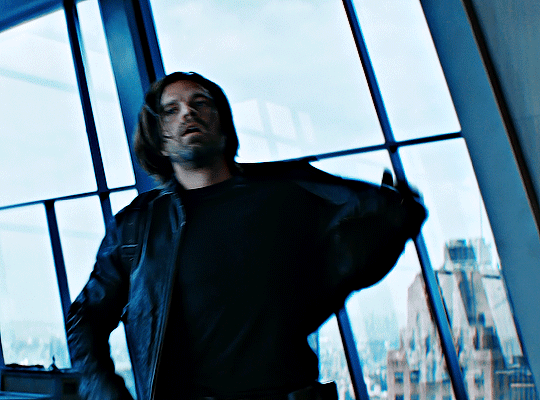
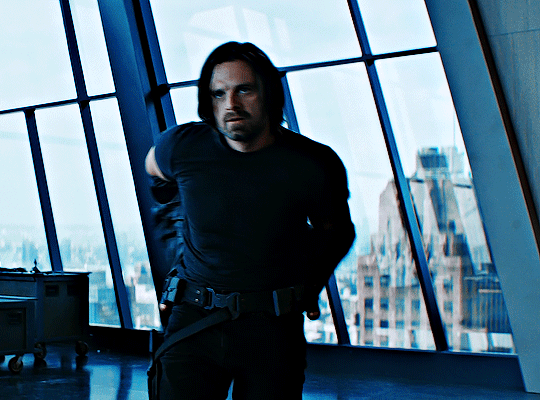
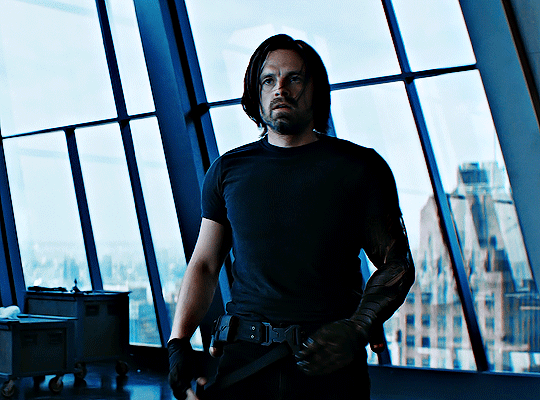
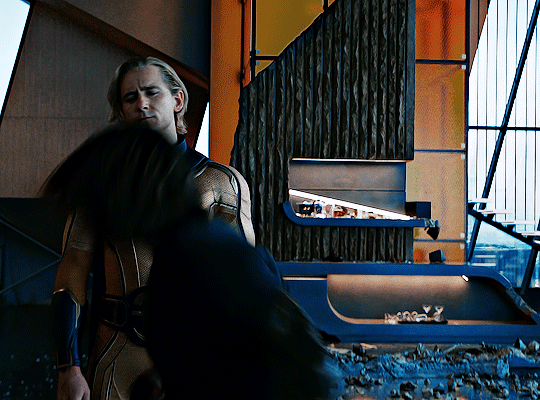
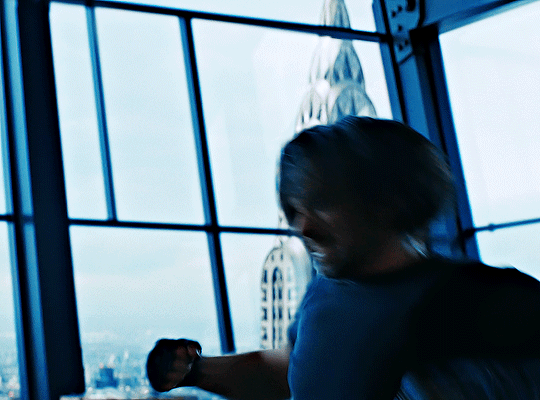
THUNDERBOLTS*
1K notes
·
View notes
Text



THUNDERBOLTS* 2025, dir. Jake Schreier
3K notes
·
View notes
Text



Thunderbolts* dir. Jake Schreier | 2025
5K notes
·
View notes
Text








JOSEPH QUINN as JOHNNY STORM The Fantastic Four: First Steps (2025) | Dir. Matt Shakman
3K notes
·
View notes
Text



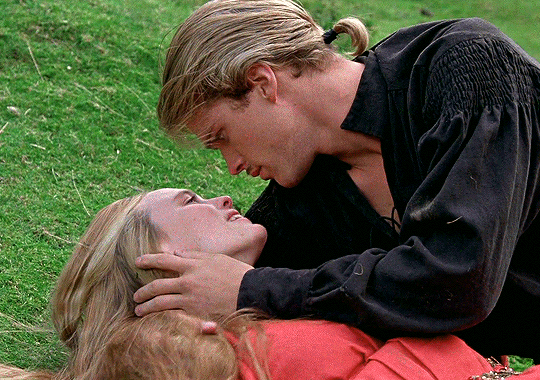

The Princess Bride (1987) dir. Rob Reiner
4K notes
·
View notes


